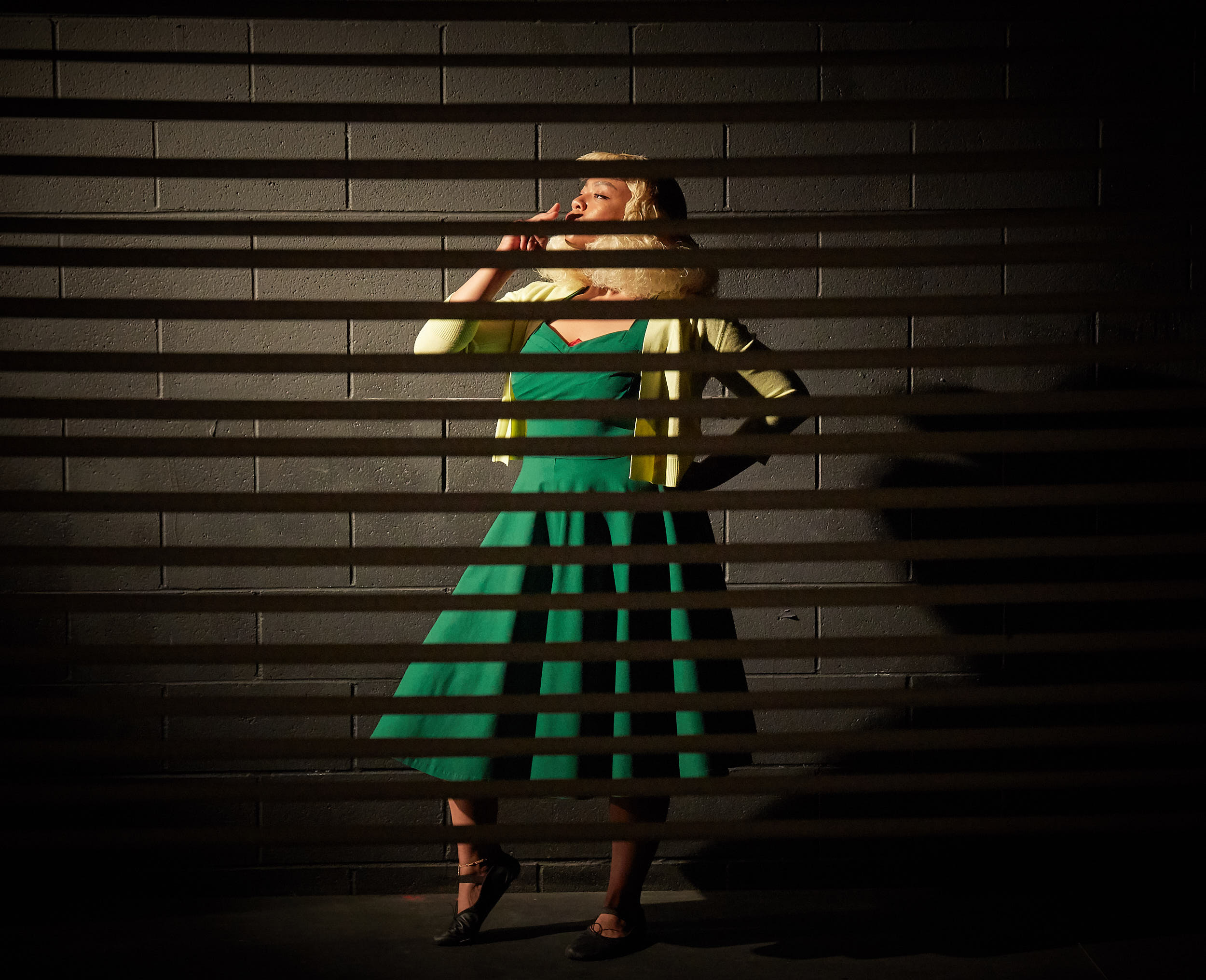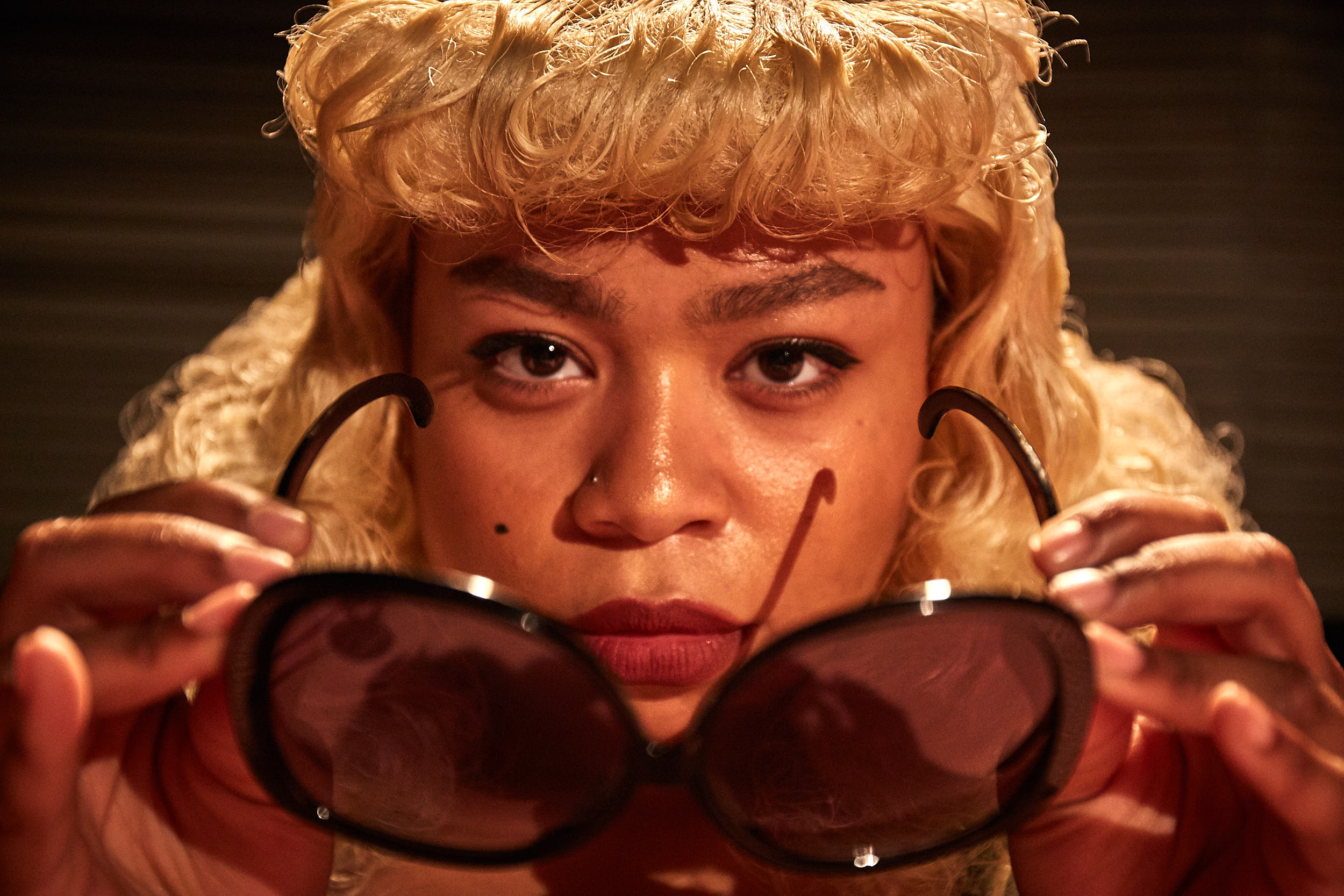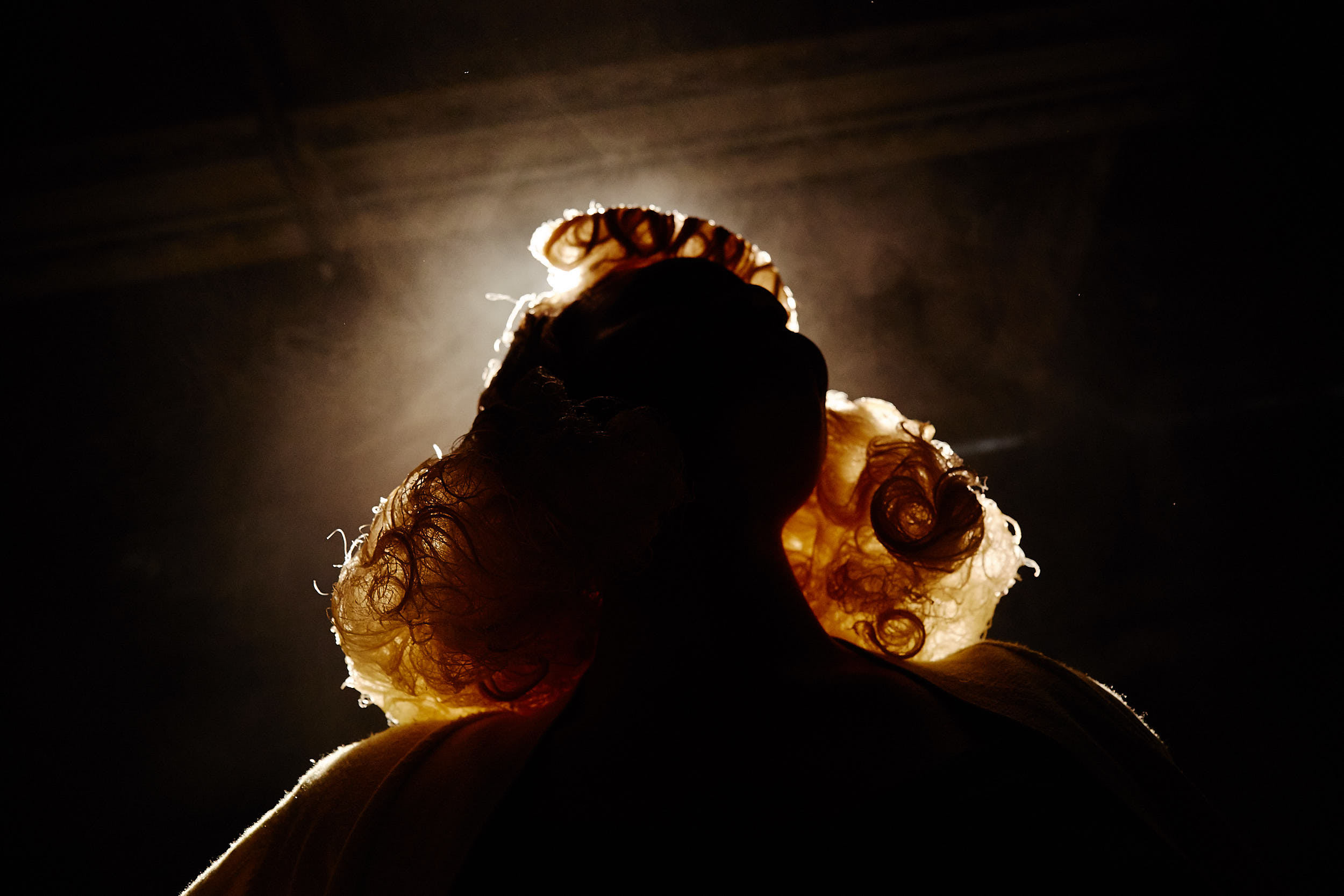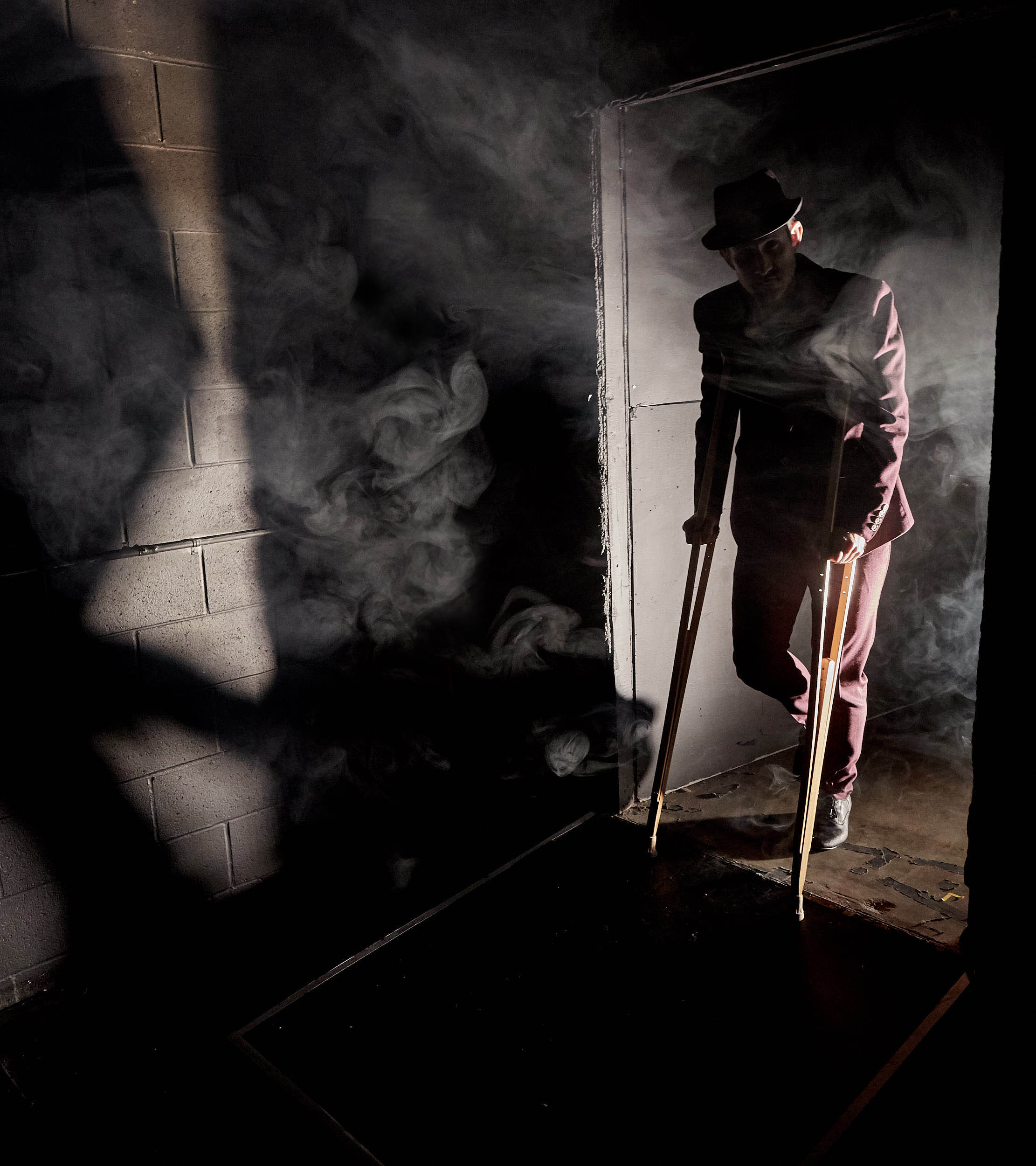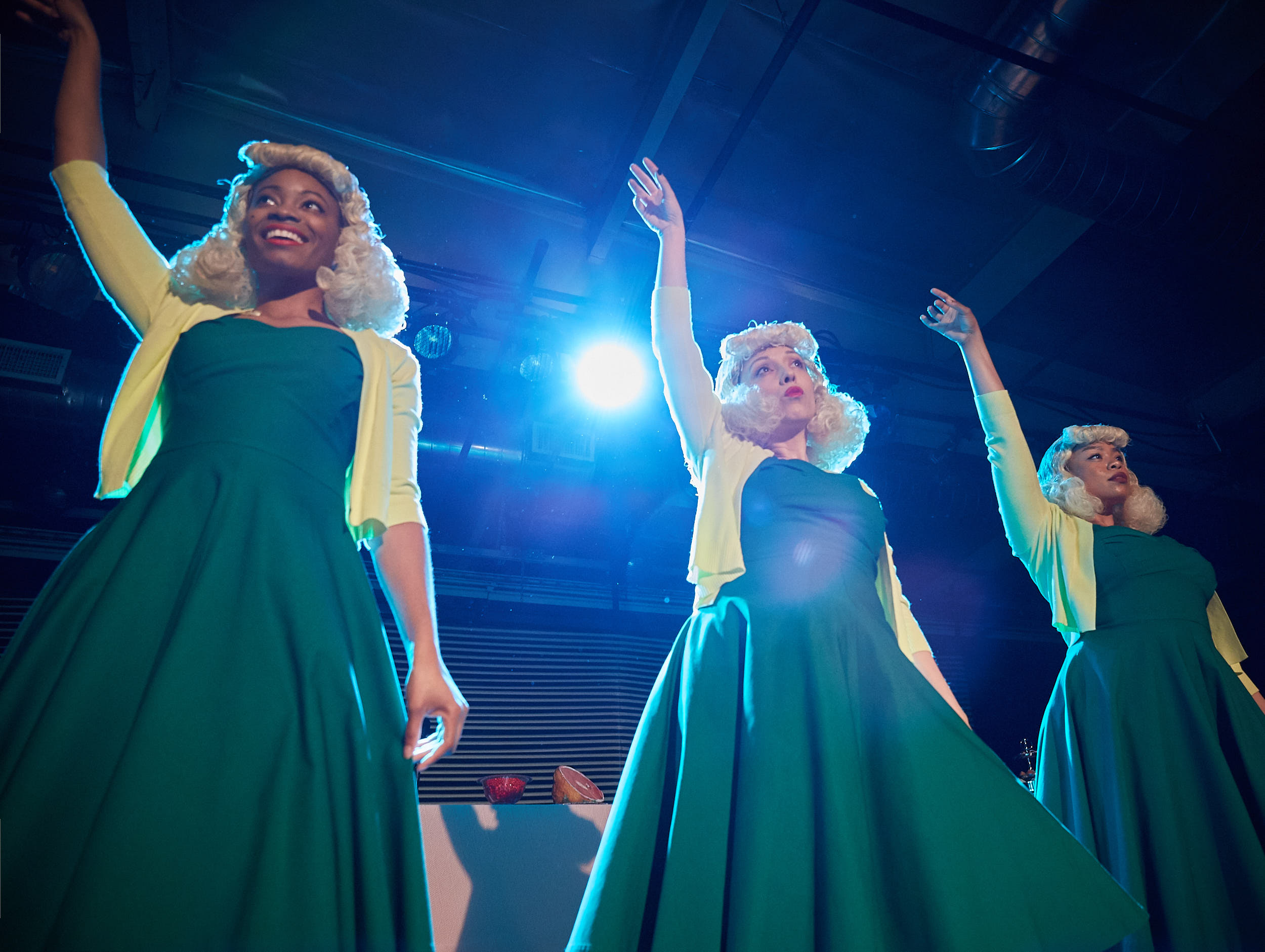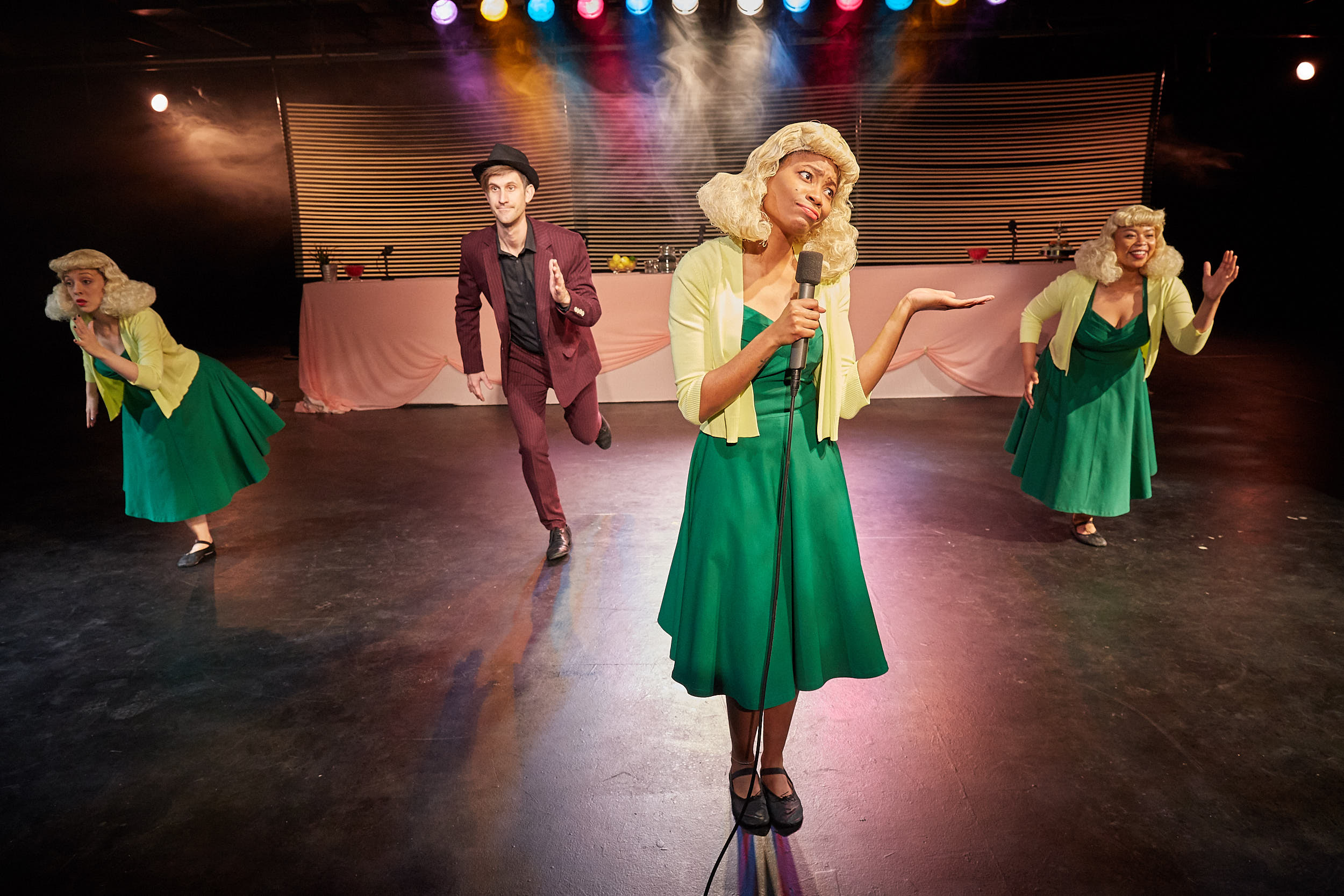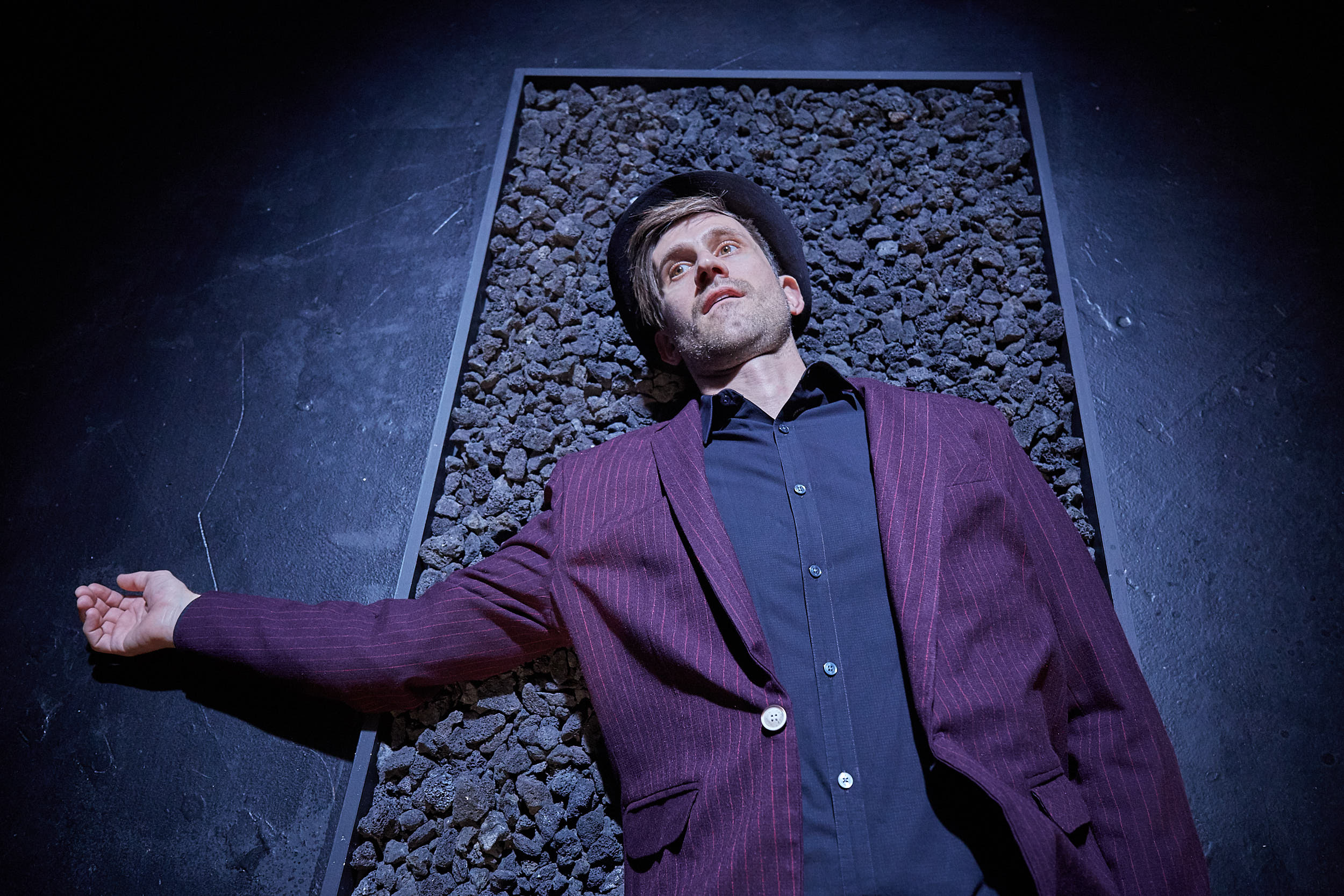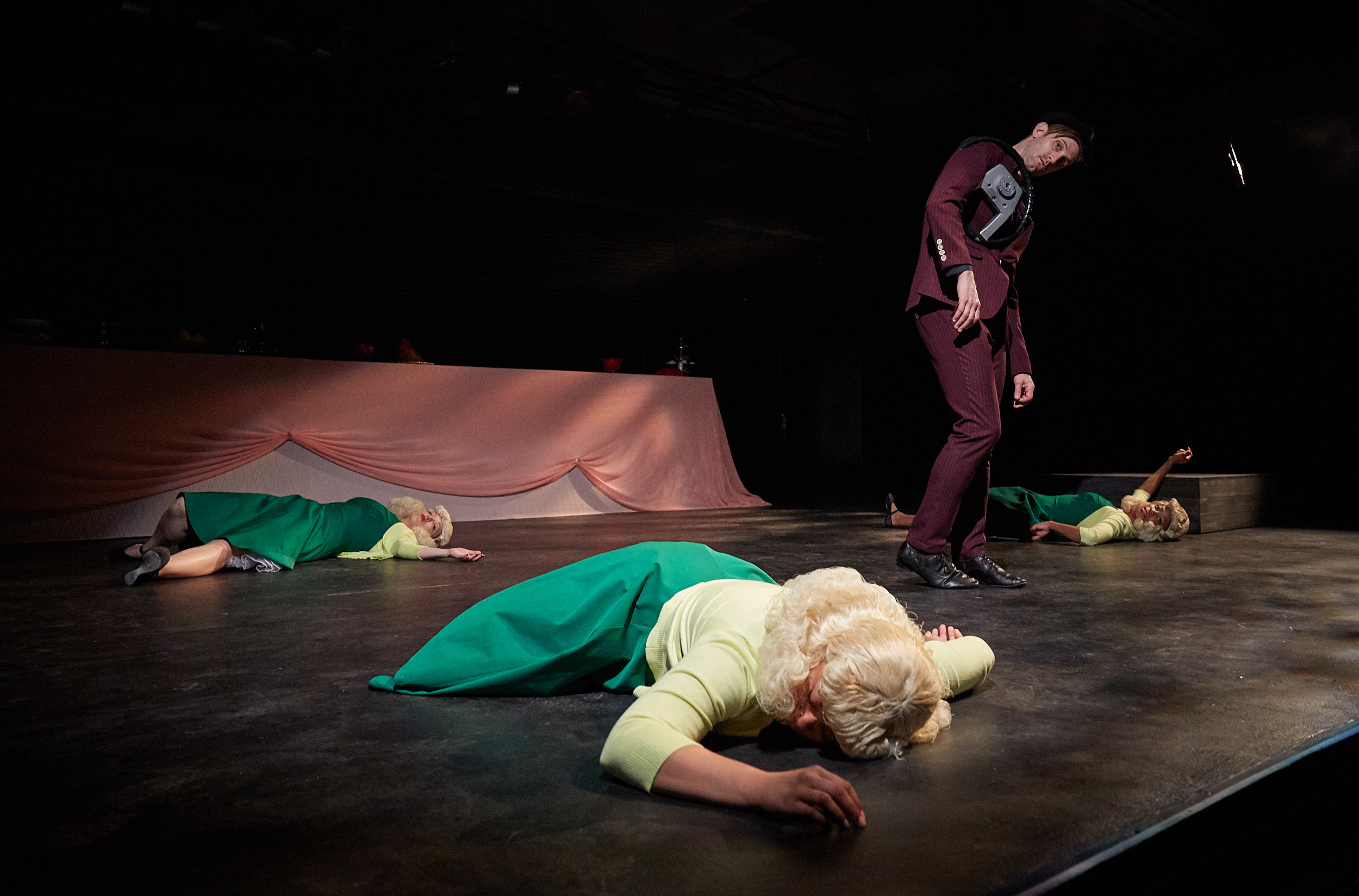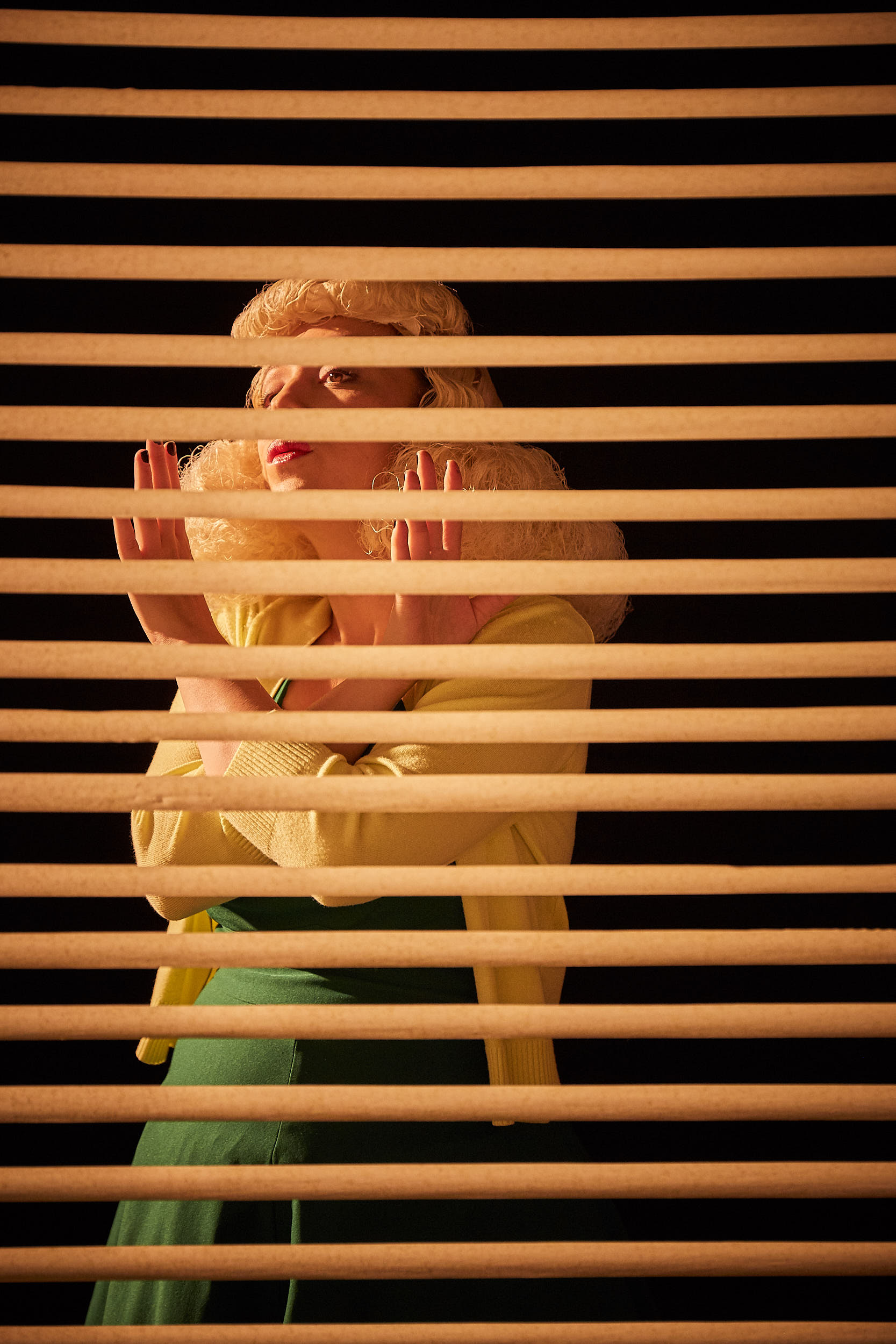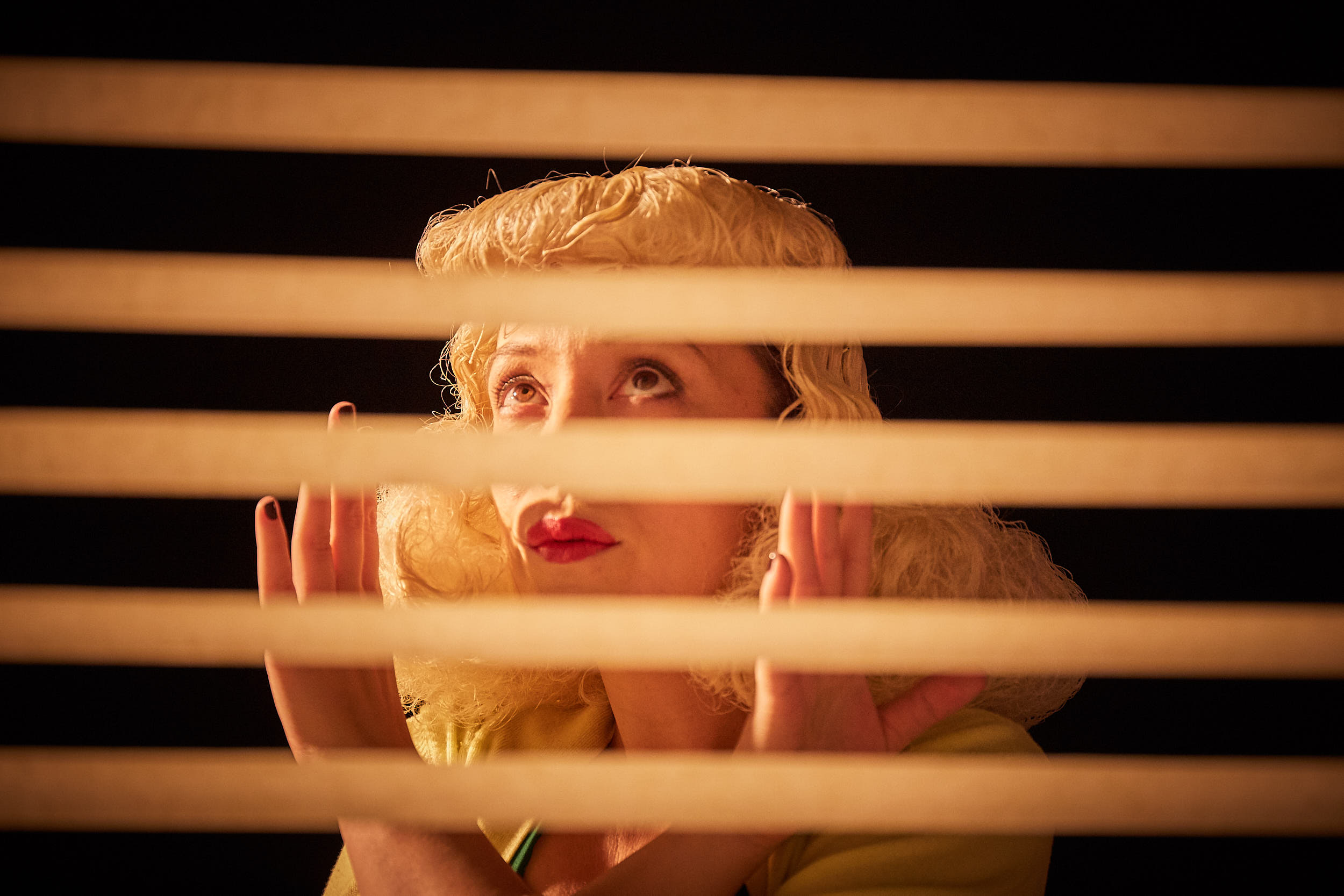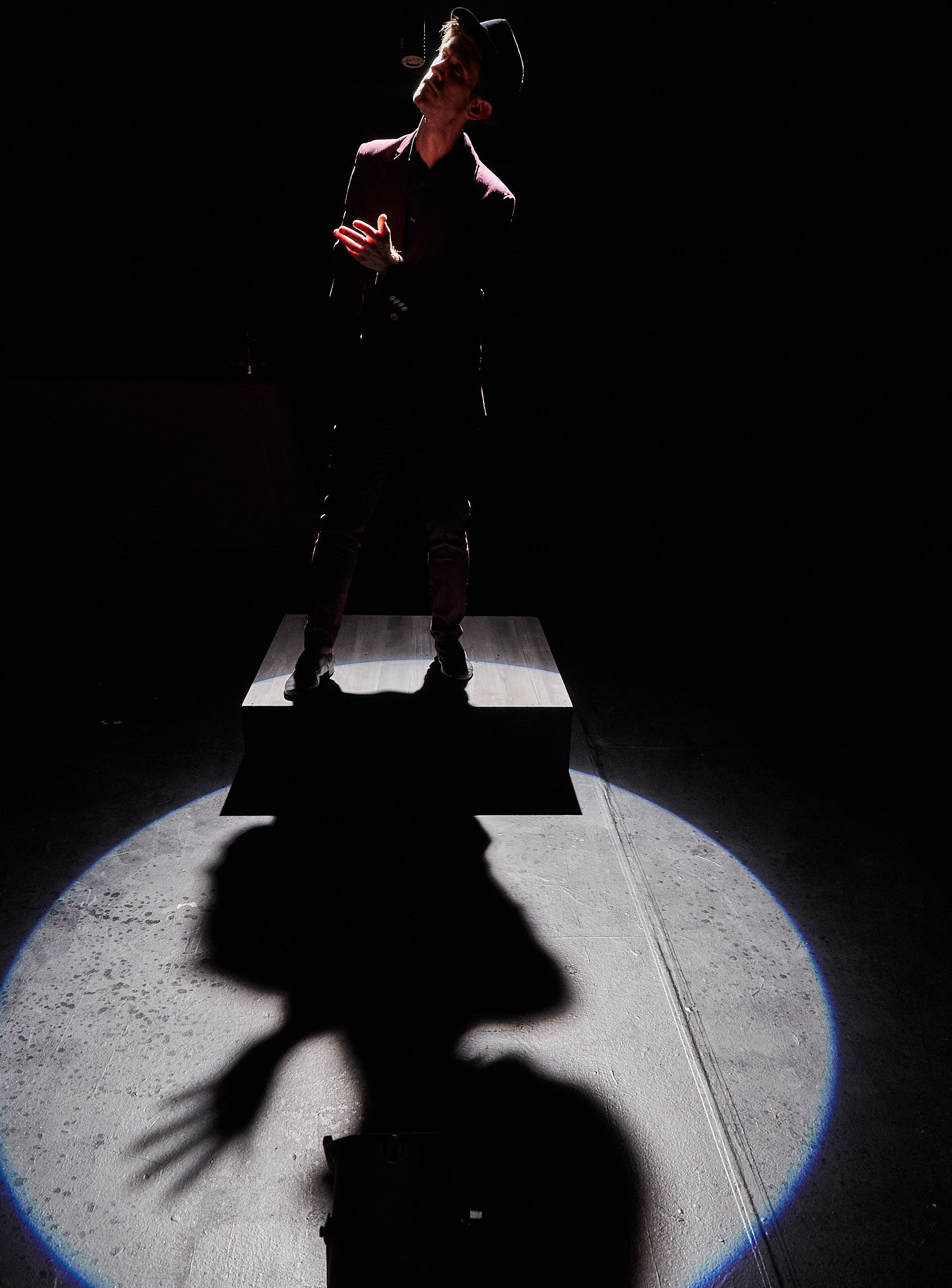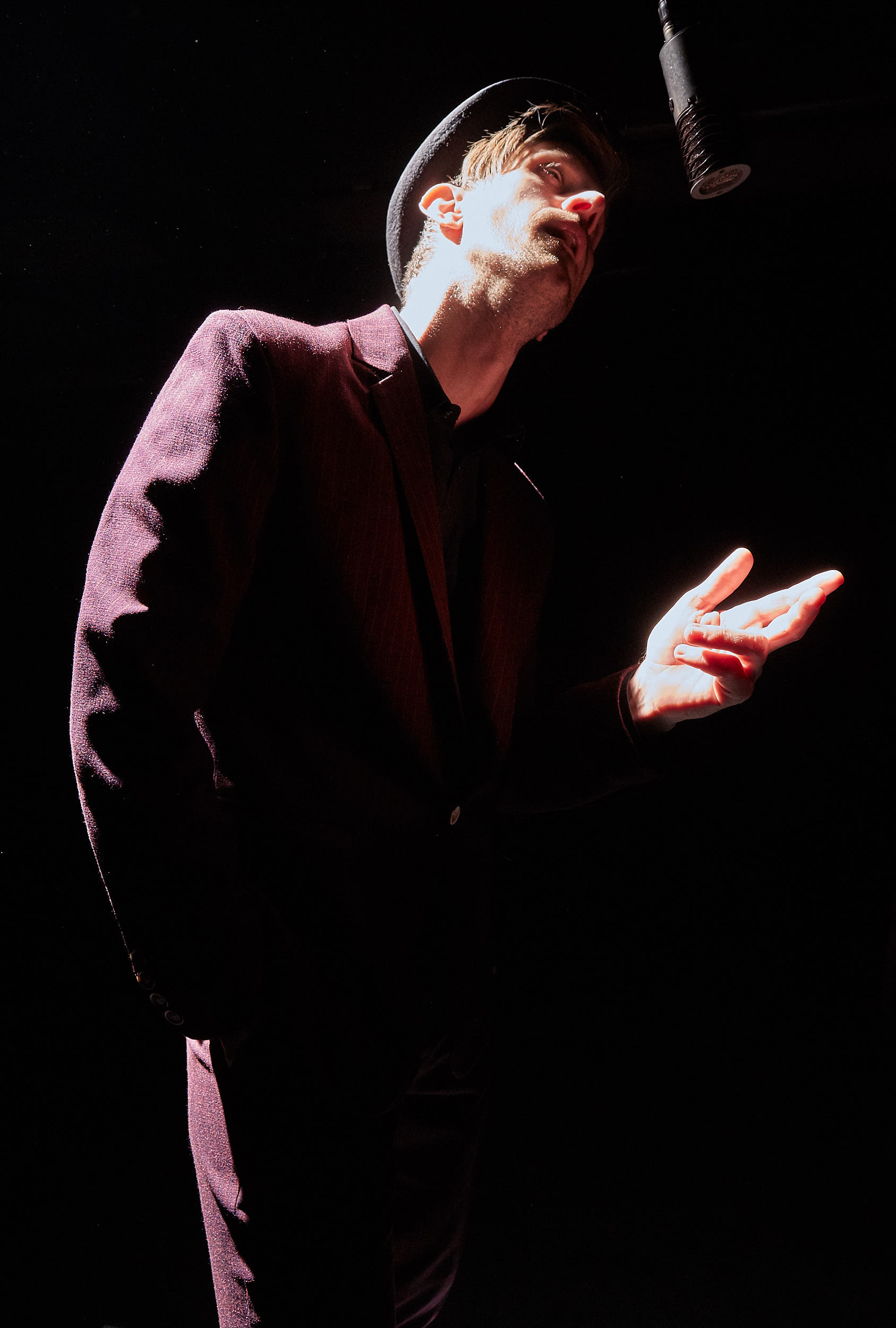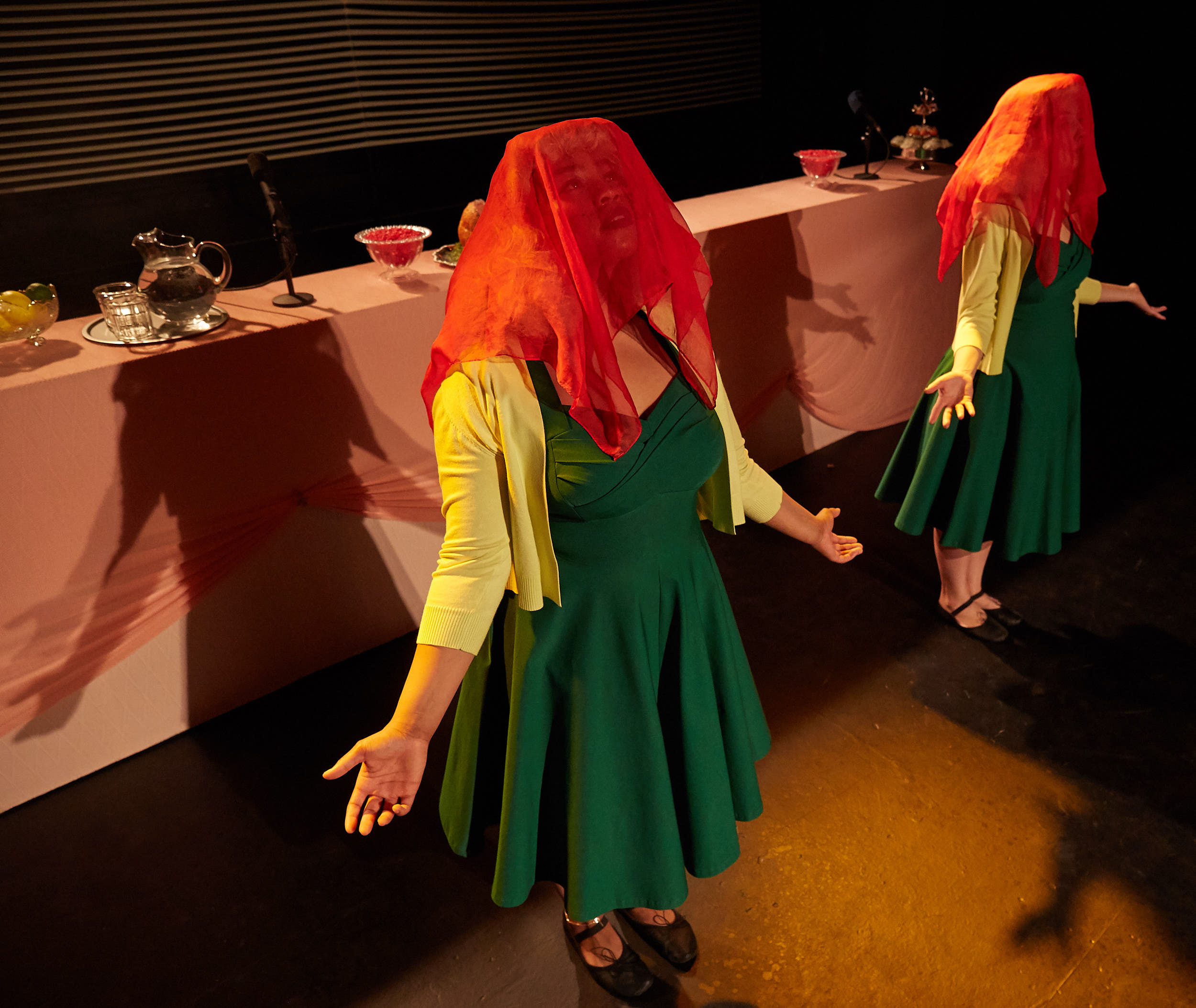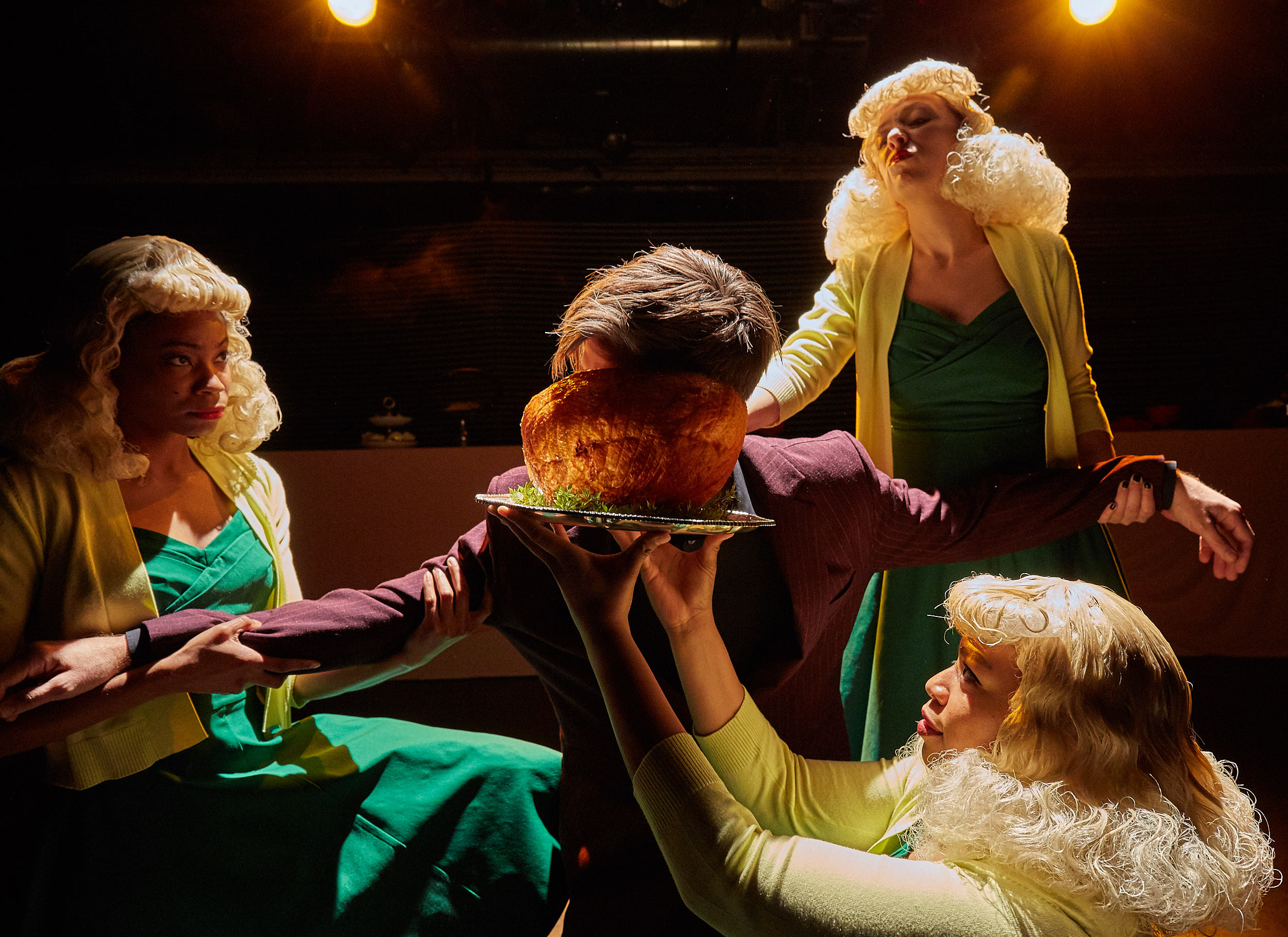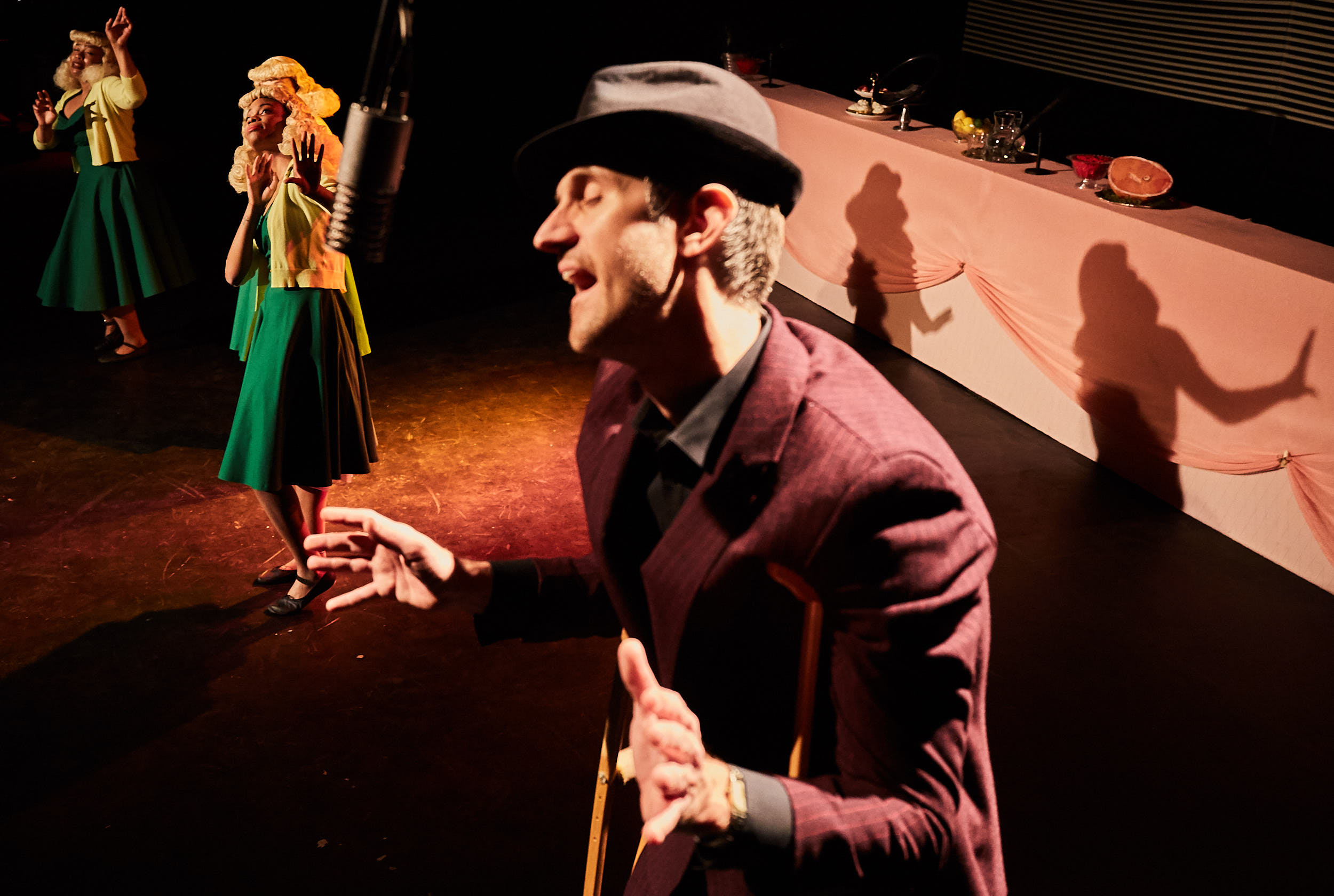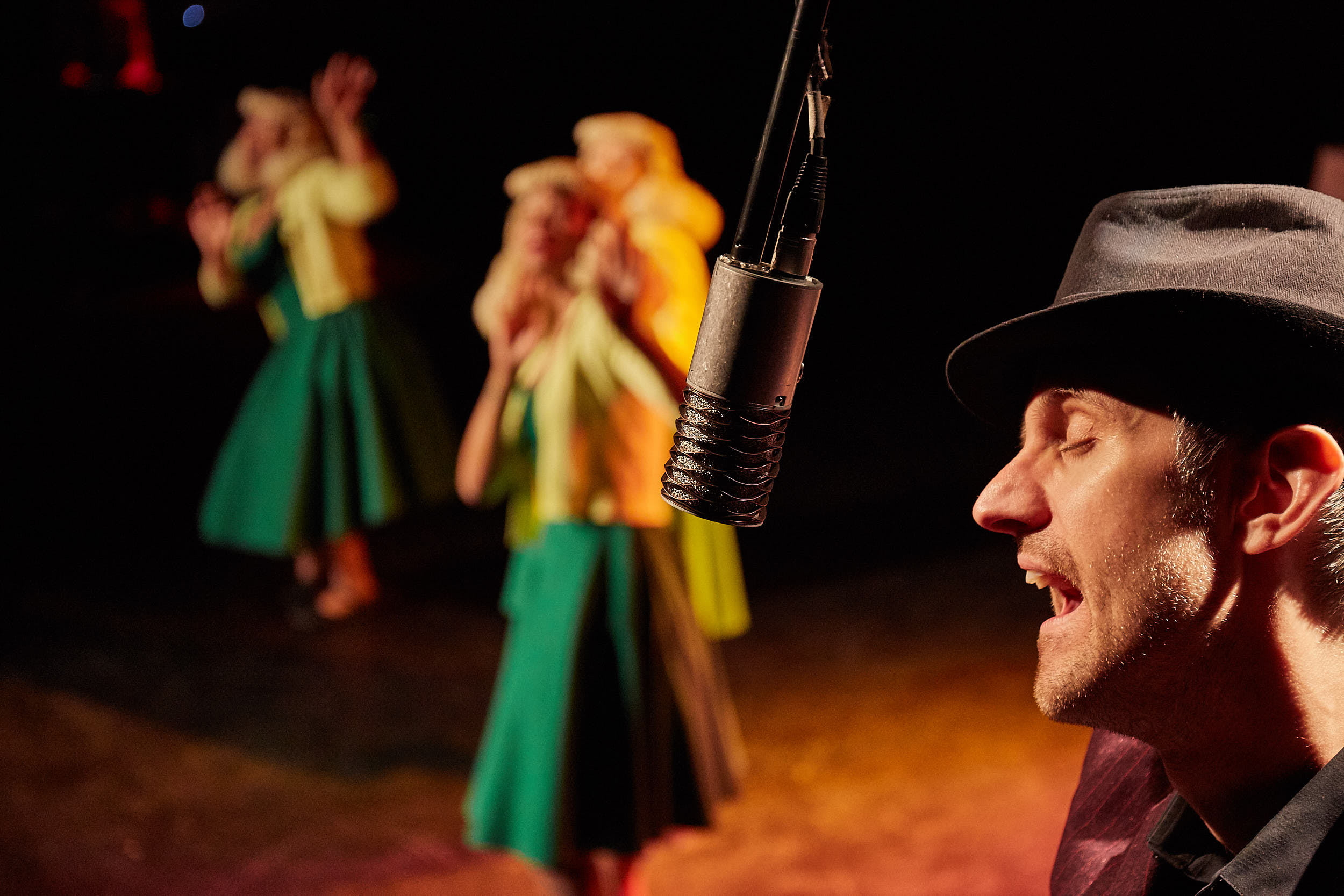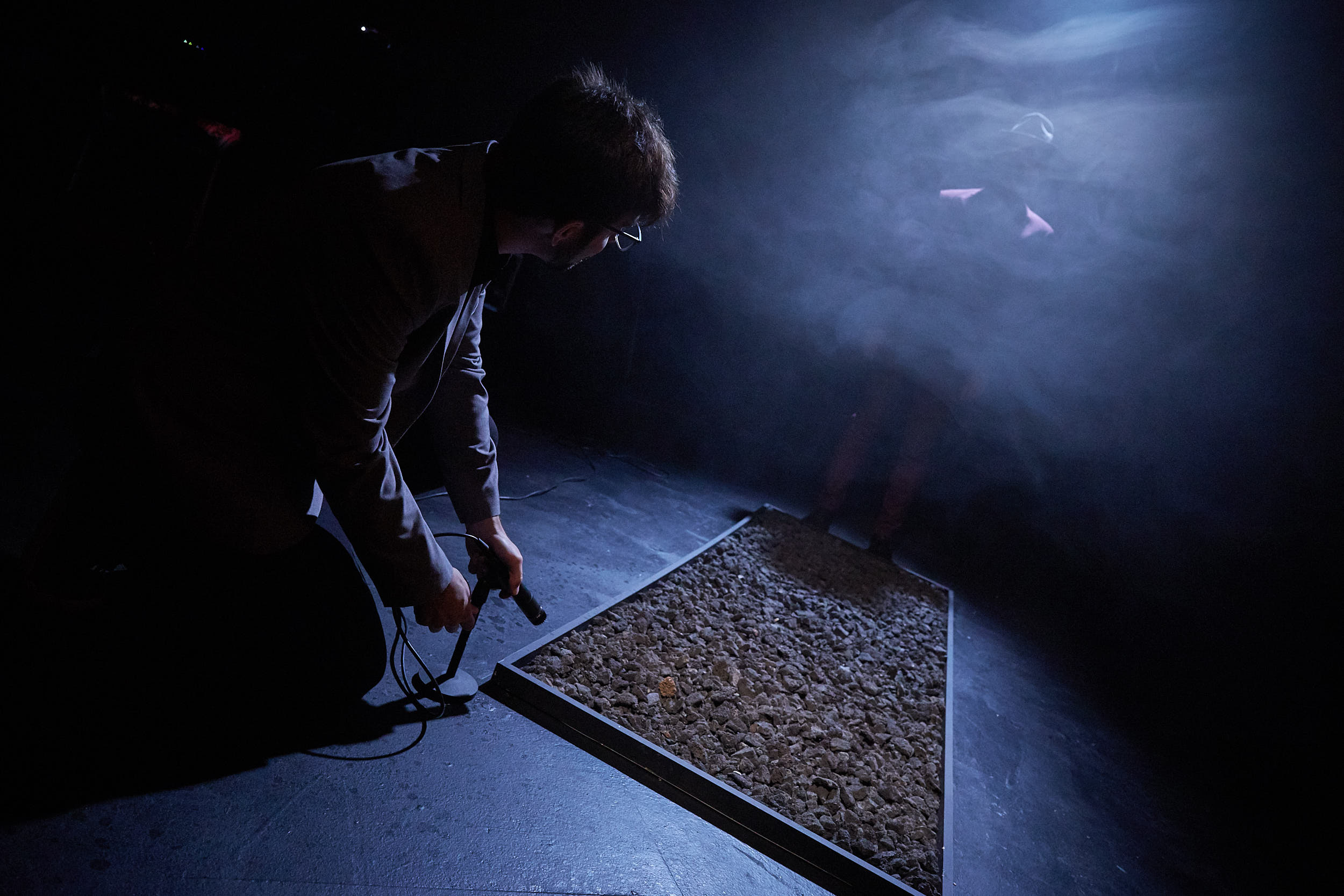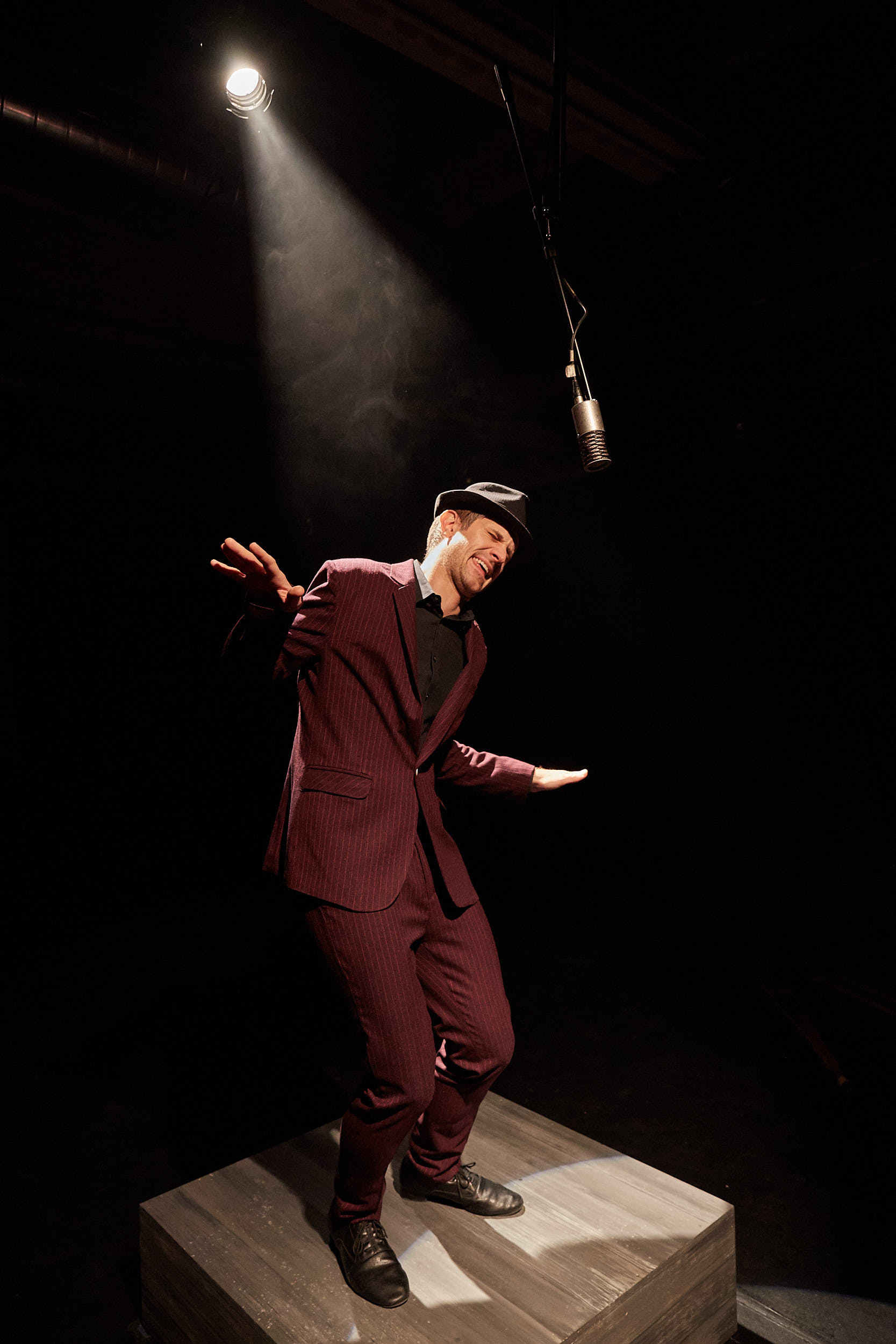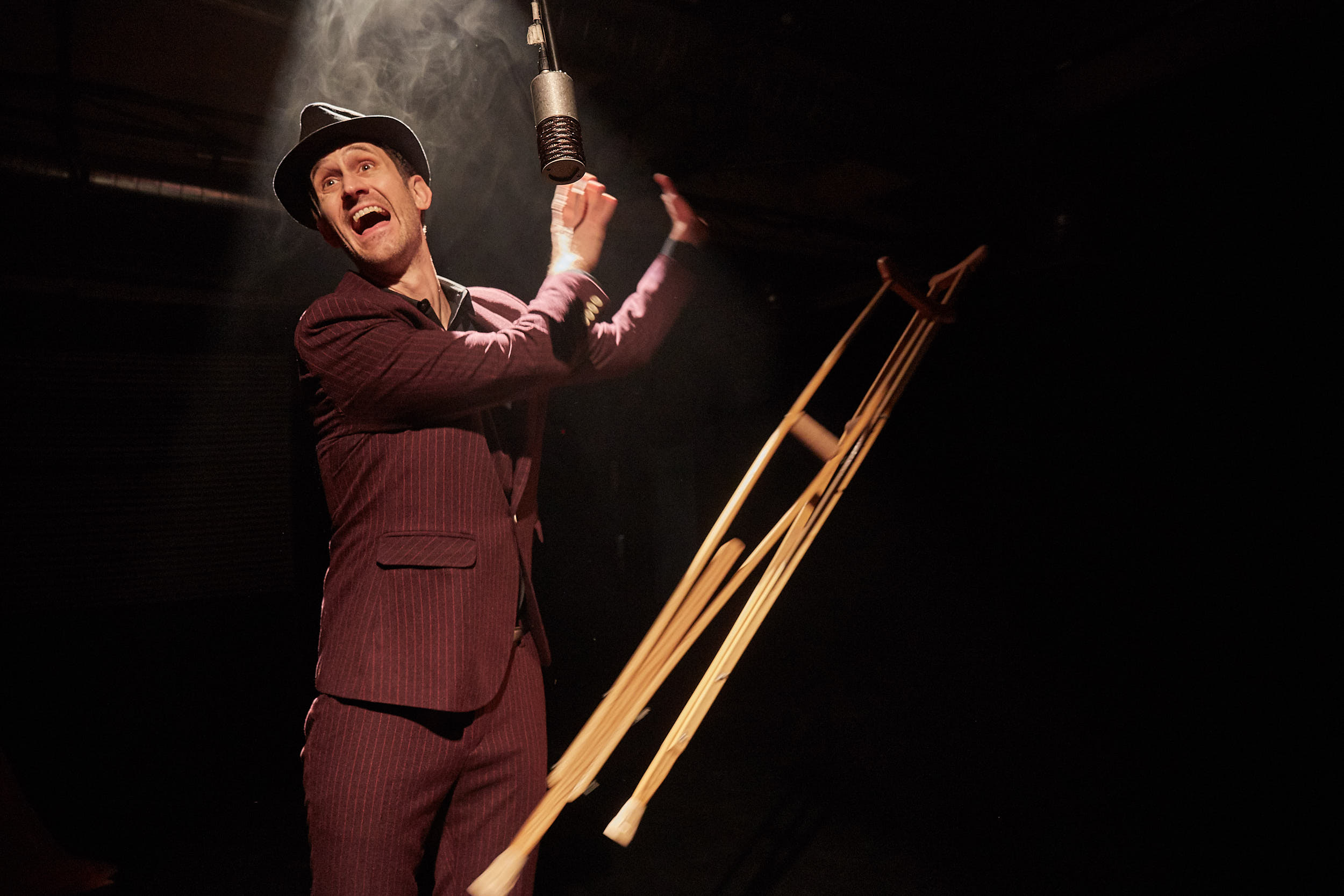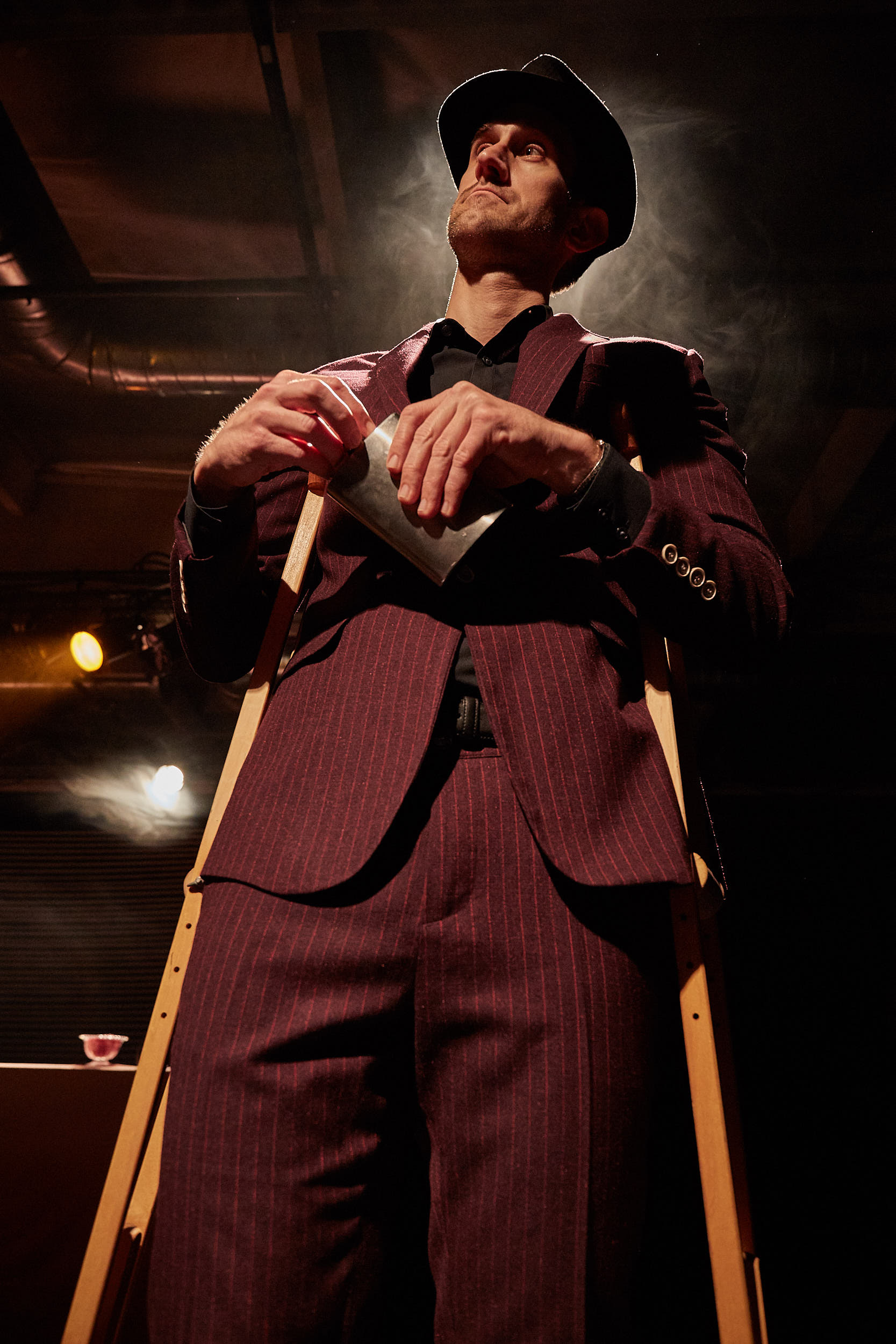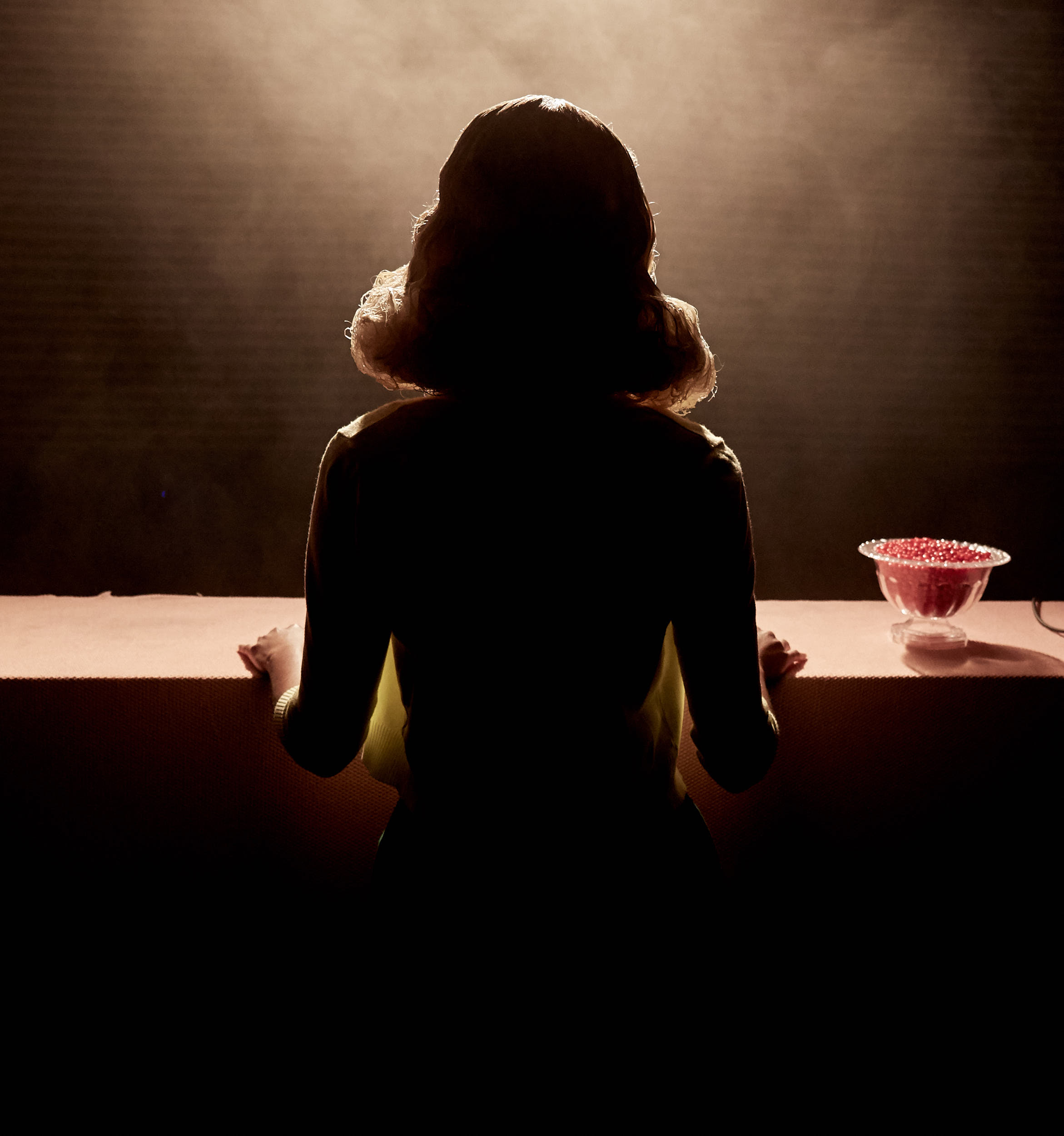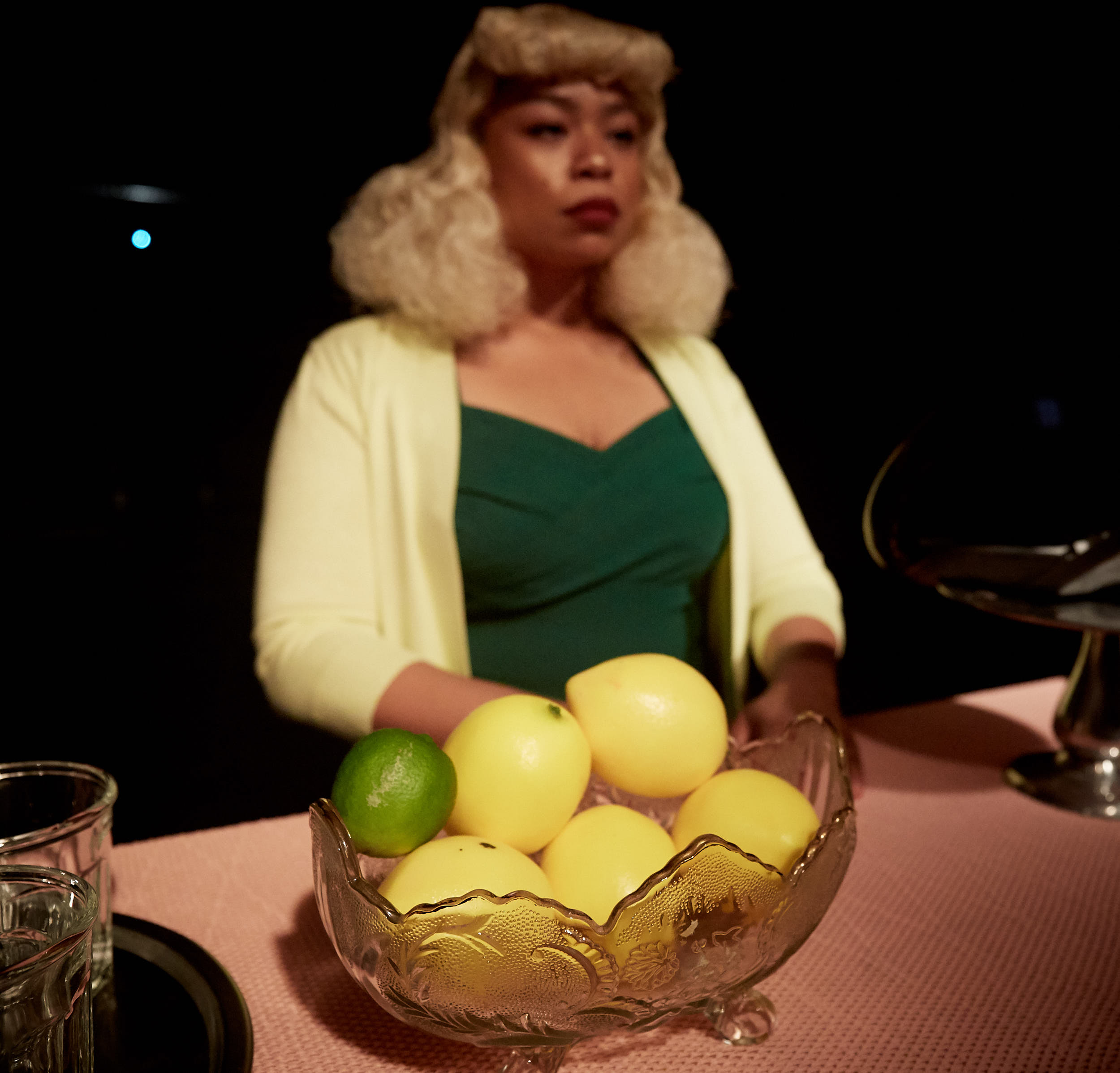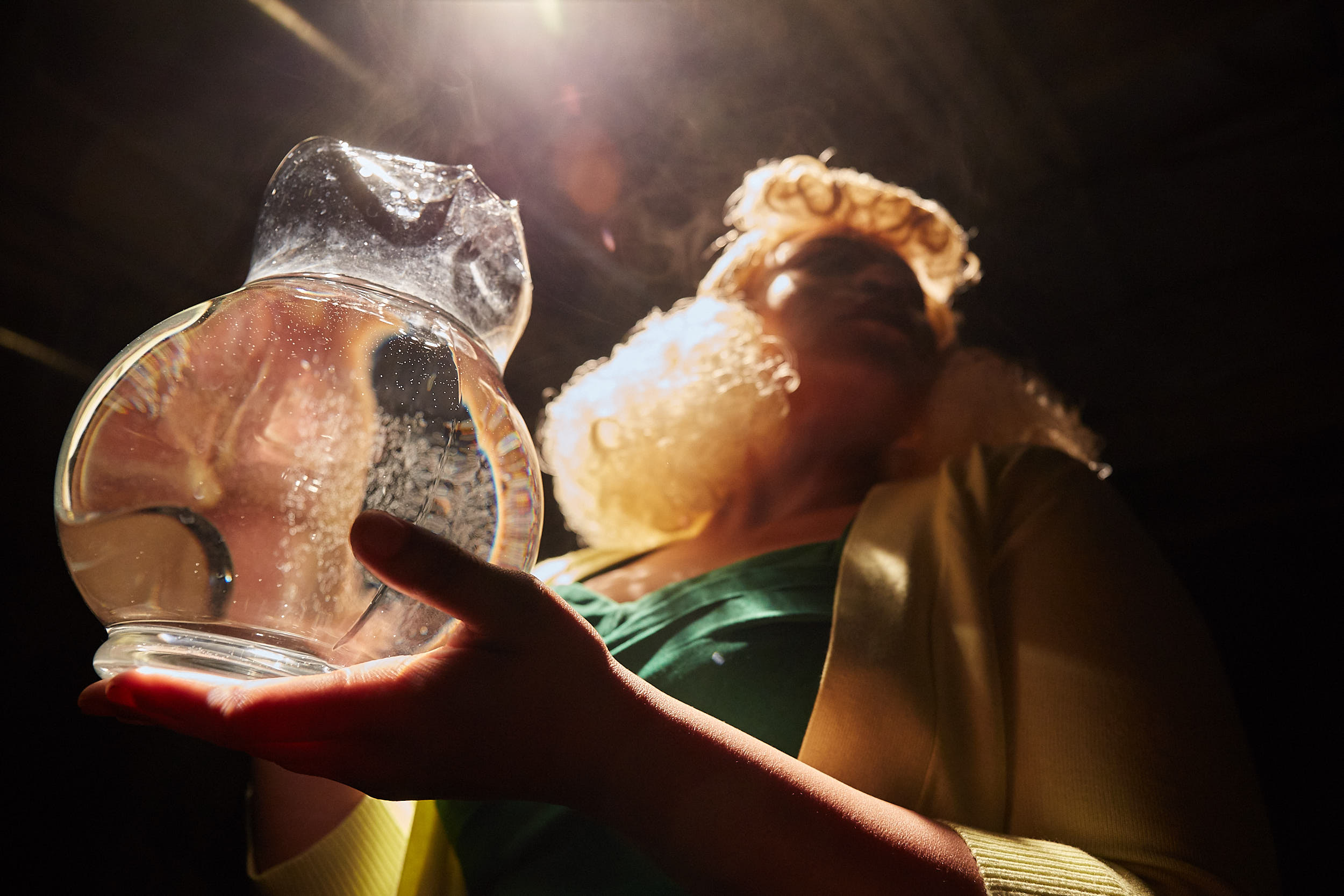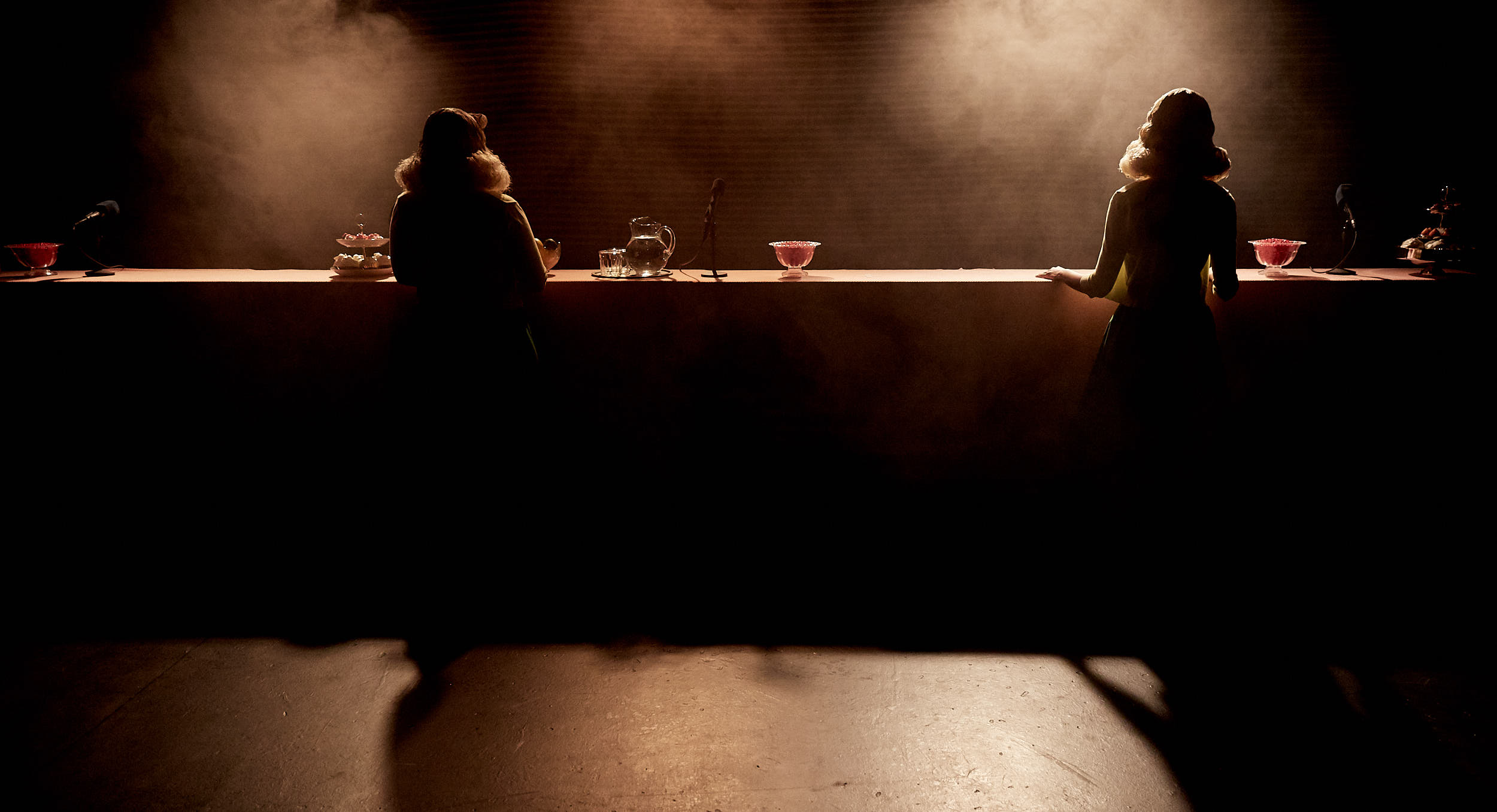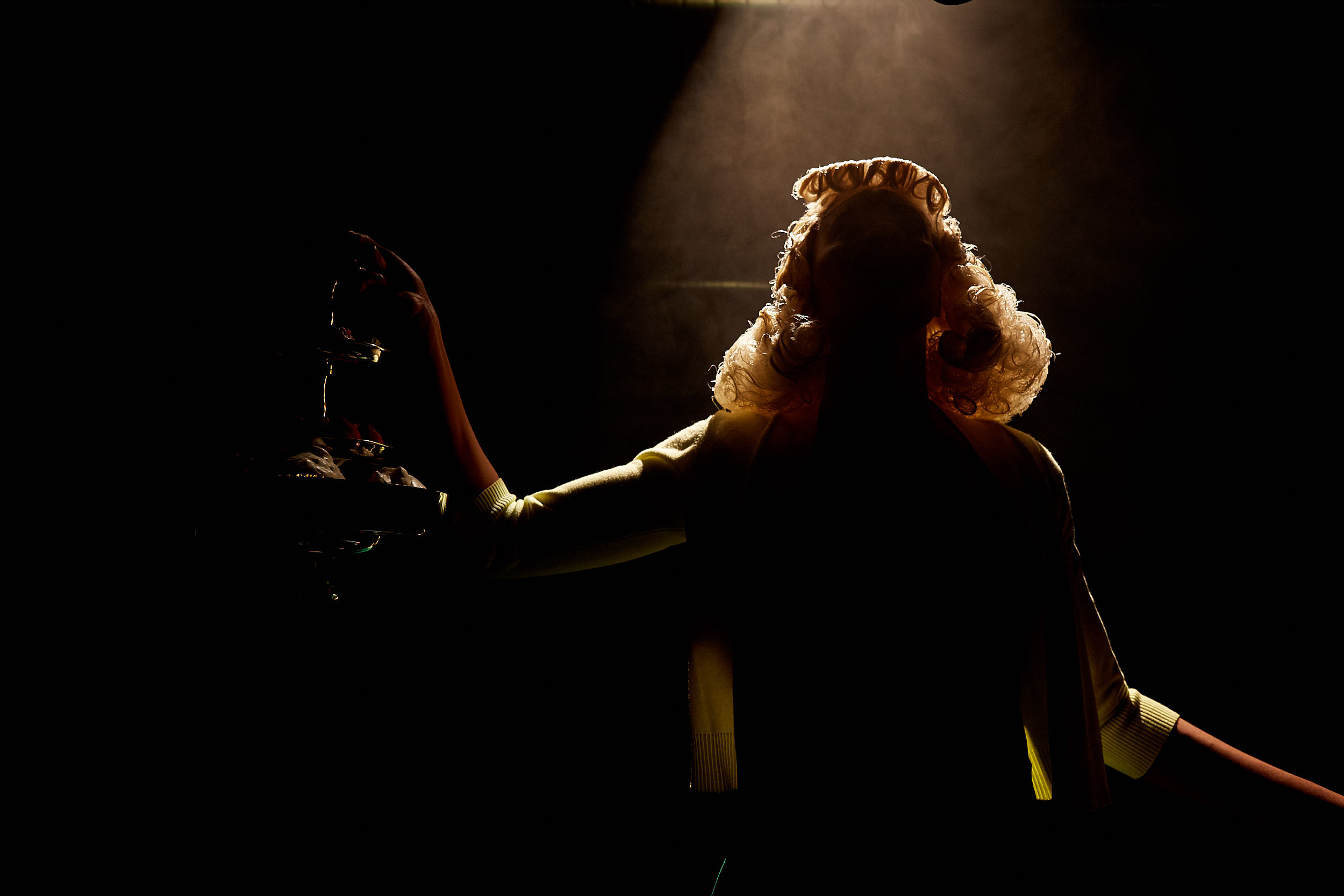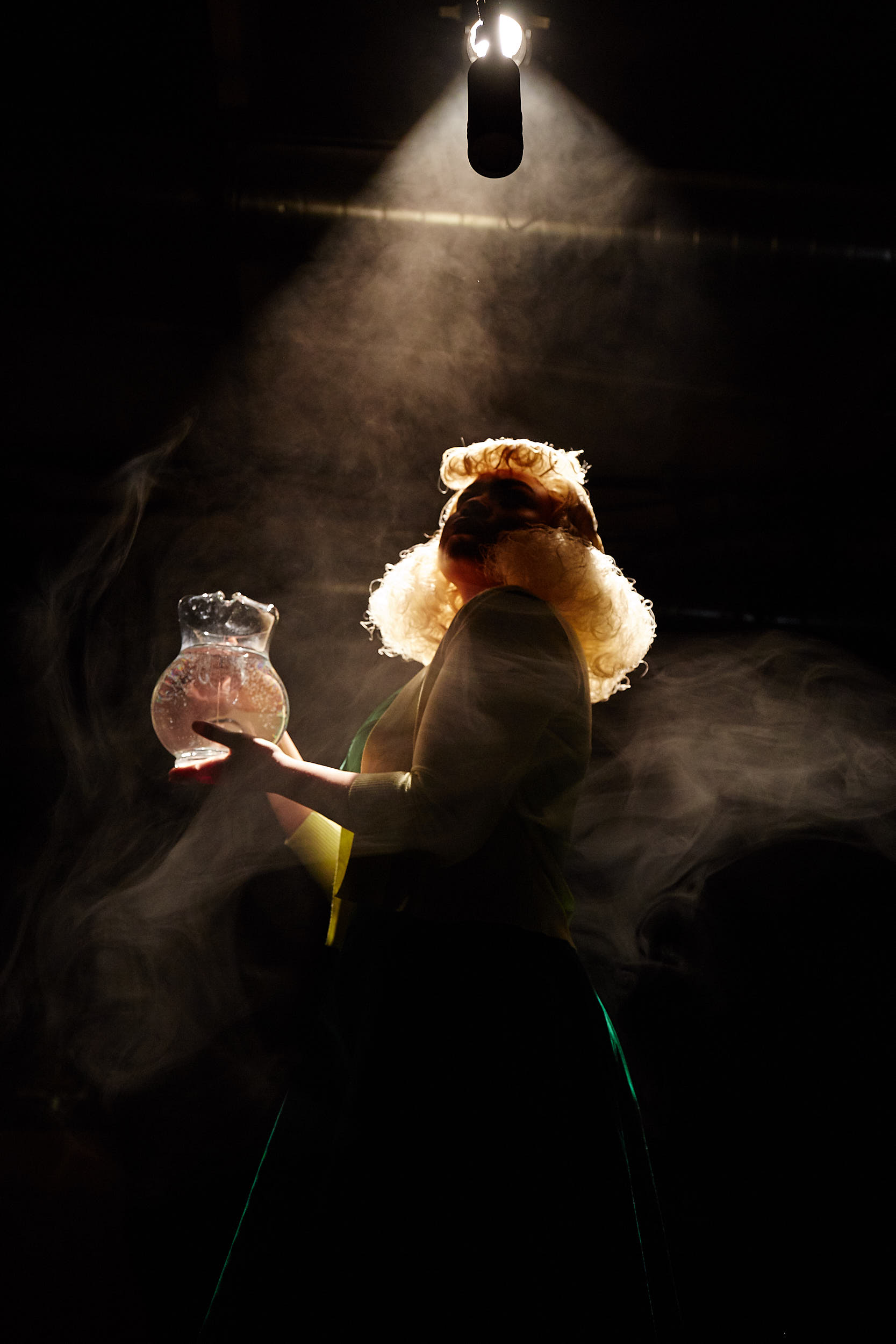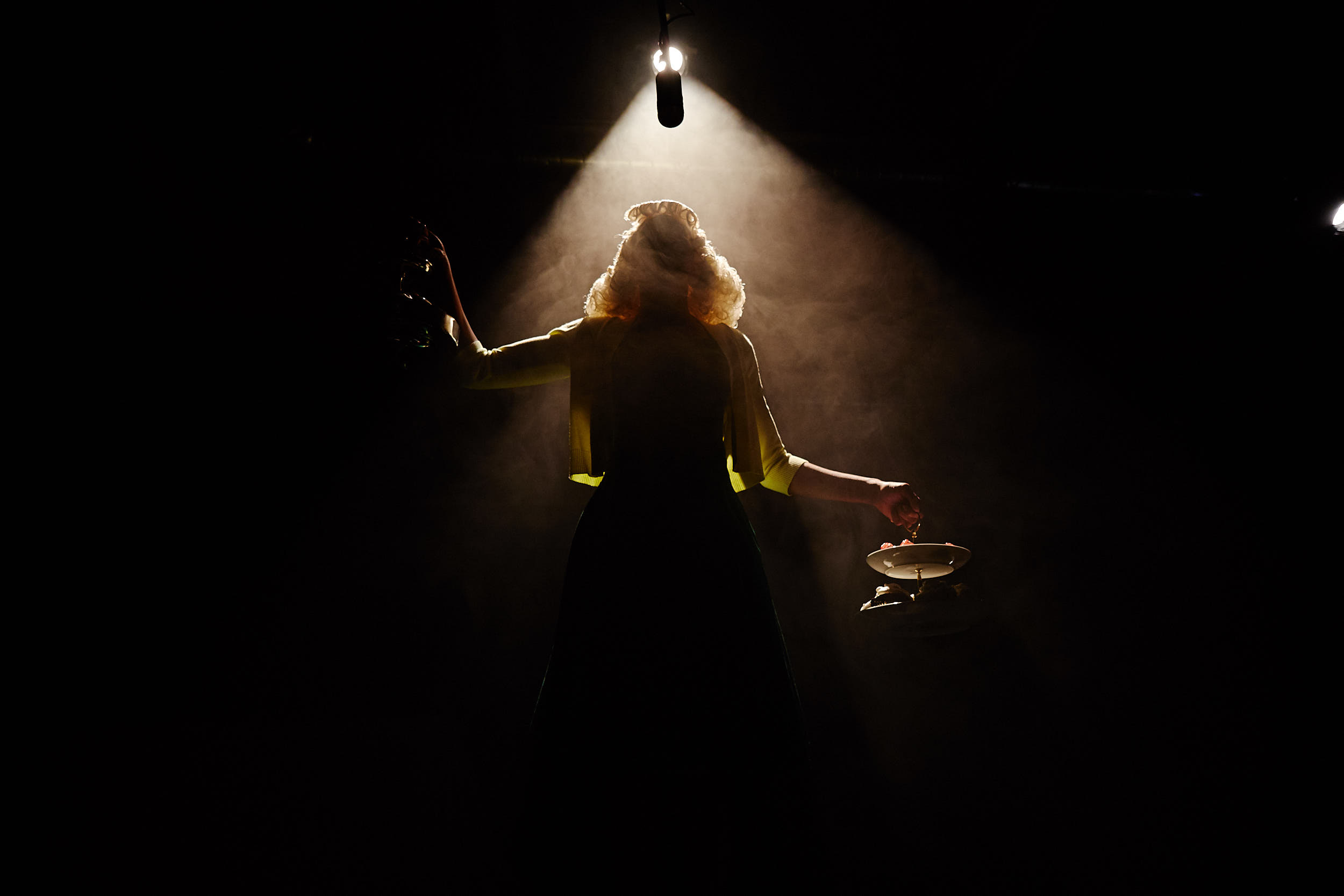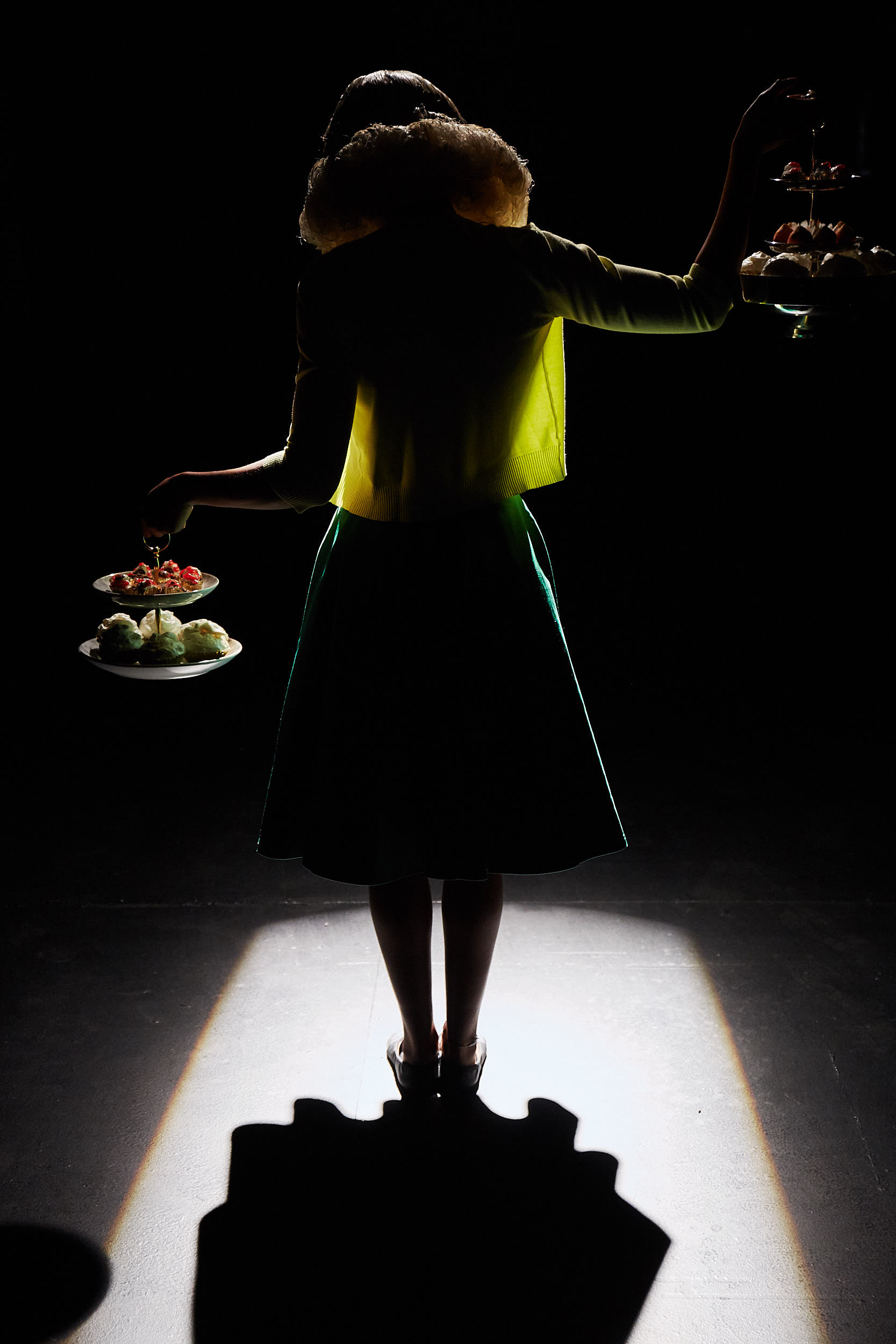Double Double
Double Double collides Macbeth with the classic film noir Double Indemnity, delivering mind-bending musical mayhem, Macbeth in a fedora, king-killings galore, honey'd hams, red hots, and three dancing witches of Stanwyck!
_________________
Listen to the Double Double Original Cast Recording!
DOUBLE DOUBLE - A Meditation on Macbeth
Premiered at the Shakespeare Center of Los Angeles in January 2019
Starring
Isabella Boose (Barbara)
Shaughn Buchholz (Walter Walter)
Jenny Greer (Barbara)
Henita Telo (Barbara)
Text by Guy Zimmerman
Adapted and Directed by Juli Crockett
Live score and sound design by Michael Feldman
Choreographer Jessica Emmanuel
Set Designer Melissa Ficociello
Lighting Designer Bri Patillo
Costume Designer Juli Crockett
Produced by Gabrieal Griego
Stage Manager Amanda Garcia
Photos by John Fitzpatrick
Reviews:
"Padua Playwrights has done it again. Guy Zimmerman and Juli Crockett's "meditation" on Macbeth and the film noir classic "Double Indemnity" follows last year's JACK BENNY as the existential show of the year to see. The similarities in the themes - murder for benefit, seduction, greed - and the blend of characters, from Macbeth/Walter to the Three Barbara Stanwytches, create a bizarre and engrossing ride of noirish 50's tropes mixed with high-octane showstopping musical numbers. Speaking of music, the live performance of the sound effects and music by Michael Feldman is astonishing - including brilliant use of microphones (especially in a repeated foley gag with a bed of gravel). I find that I watch Juli Crockett's productions in the same way that I ride Space Mountain at Disneyland. There's so much meaning, such a fast flow of information, and such a barrage of seemingly disconnected ideas and inspirations, that simply lying back and letting everything wash over you, picking up what you can in the torrent. This is theatre as "theatre" - creating work to tickle your senses and make you think rather than simply cater some pre-packaged entertainment."
"Last week I had the true pleasure of experiencing Padua Playwrights audaciously steamroll through the Los Angeles Shakespeare Center with a sound and fury that any idiot would be proud of. Absolutely one of the most fun times I've had at the theatre, Double Double ingeniously mashes up two of the most infamous tales of murderous collusion born of passionate ambition, Double Indemnity and Macbeth. The production takes no prisoners, wickedly trolling both Los Angeles and Shakespeare in their own Center, as well as the medium of experimental theatre itself (the beginning of the play starts with an over long, over serious, over dreary, over drawn out sequence, provoking a collective "oh god, we have to watch this avant garde shit for an hour", only to dazzle us soon after.) And while all the dancing and king-killing may seem to signify nothing, Guy Zimmerman's play offers macabre relevance, relating manifest destiny from England (Macbeth) to Los Angeles (Double Indemnity) as the cultivation of a culture of "would-be Kings", destroying whatever lay in the path ahead, be it nature or fellow man, in order to feed our own fleeting ambitions. Dark stuff from Guy; vicious and terse. Enter our fabulous director Juli Crockett to sprinkle some joy and silliness into the violence pot. The show is segmented into vignettes of ecstasy and irreverence that keeps the audience on its toes, wondering what was just witnessed, laughing all the while, only to piece the puzzle together during the uber ride home. The cast as a whole deliver with vigorous precision and seductive focus. The hyper-skilled Shaughn Bucholtz is magnificent as the crippled, adulterous, alcoholic, toe-tapping, MC'ing Macbeth. His three accompanying Barbara Stanwyck-Witches take him through a perilous fever dream of song and dance, choreographed by the brilliant and prolific Jessica Emmanuel. Jenny Greer brings centered focus to the coven with alluring depth in every move she makes. Henita Telo’s stellar talent is undeniable as she eats the audience alive with her eyes. And Isabella Boose is a treasure to behold, a hilarious, giggly sprite with a glint in her eyes that says, "isn't all this theatre shit silly." The ensemble performs the piece with confidence and cojones. The Petal Soundsations would be proud. Bri Patillo's lighting design makes the whole affair look beautiful and 'seem' legitimate. ;) Michael Feldman's incredible live scoring is the glorious glue that holds the chaos together. This was a show to see. And must be shown again."
“DoubleDouble playwright Guy Zimmerman reveals in the program notes, “came out of a case I wanted to make for Macbeth being history’s first Angeleno.” Zimmerman, the Padua Playwrights artistic director, attempts to clarify that assertion by hinging the Scottish play to Paramount Studios’ 1944 classic crime film Double Indemnity.
At first glance, the notion of interjoining Shakespeare’s Macbeth (1606?) with Billy Wilder’s iconic film noir might strike one as a muss up of the first order. But on closer inspection a conspicuous, if unexpected, cohesion connects the components of the two. Their central plots each concern a murder for “profit” told from the murderers’ view point. Each delves into the psychology of murder, while investigating the act’s sexual aspect. The main characters of both are not criminals but flawed human beings corrupted by their ambitions. Each exists in a shadowy world in which outside forces threaten to destroy them. And finally, both find inspiration in actual events and the executions linked to them.
The history of Scotland as told in Holinshed’s Chronicles was Shakespeare’s primary source for Macbeth, but Harold Bloom and other Shakespearean scholars argue the failed gunpowder Plot and the execution of the Jesuit Priest Henry Garnett influenced the bard as well.
The basis of author James M. Cain’s first two novels was a 1927 murder trial he covered as a reporter in New York. Ruth Snyder was accused and convicted of murdering her husband, with the help of her lover. She had taken a large insurance policy, with a double-indemnity clause out on him. Given the death penalty for her crime, an enterprising young reporter managed to sneak a camera into Sing Sing when the sentence was carried out. His snapshot of Snyder strapped into the electric chair was the decade’s most famous photo.
Zimmerman and Director Juli Crockett, succeed in juggling the two works with dizzying aplomb overlaying snippets of dialogue plucked from both while dropping hints of shared motifs like bread crumbs to lure their audiences deeper into the forest than it is safe to go.
The “snippets” which Zimmerman and Crockett selected, though small, are fiercely fragrant with Shakespeare’s poetry and that of L.A.’s poet-saint Raymond Chandler who, with Wilder, produced the filmscript of Double Indemnity.
There is no aspect of this production that doesn’t shimmer with intelligence in concept and execution.
Scenic Designer Melissa Ficociello provides an elegant cloth covered table that extends across the stage as if in expectation of a dozen disciples showing up. Onto this stage emerges the three weird sisters, in this case a trio of Barbara Stanwyck doppelgangers in the role of Phyllis Dietrichson, clones right down to the absurdly cheap looking wig that had the Paramount executives spewing with indignation when they saw it. * *
The Barbara triplets (Henita Telo, Jenny Greer and Isabella Boose) bind the two separate works as firmly as Chang and Eng the original Siamese twins.
Macbeth’s fate was determined at his first encounter with the weird sisters. In Double Indemnity the fate of Walter, played by Fred Mac Murray was sealed the moment he set eyes on Stanwyck. In DoubleDouble the aptly named character of Walter Walter (Saughn Buchholz) is oblivious to the doom awaiting him in the web spun by the Barbara clones.
Dialogue from both works intertwines with the pacing and playfulness of two frolicking otters, but unwilling to rest on the poetics of others, Zimmerman and Crockett called on the talents of Michael Feldman to provide the production with a couple of ballads which oscillate between Brecht and PDQ Bach.
Does Zimmerman make his case that “Every American is a little Macbeth ready to kill for a little happiness just out of reach?” Beats me. But like their Jack Benny (A Ménage En Train), one of the best shows in last year’s Hollywood Fringe Festival, DoubleDouble at the Shakespeare Center of Los Angeles * * * * comes at the audience like a Three Card Monty tournament masquerading as a Zen Koan. It is intelligent, superbly crafted, utterly perplexing and thoroughly entertaining, and the creative collaboration between Zimmerman and Crockett lack only a pair of capes to qualify them as the most dynamic duo you’re likely to find this side of Gotham.
♦ ♦ ♦
“After watching the first dallies, a Paramount executive spun on Wilder and bellowed, “We hire Barbara Stanwyck and here we get George Washington.” David Iker Sanchez recreates the wigs stylishly for DoubleDouble.”
- Ernest Kearney, The TVolution
“Double Double is a wild and delightful ride through the world of Macbeth and into the land of Double Indemnity, a strange musical film noir (theatre noir?) with excellent performances by all four cast members and some quirky and exciting and fun songs. It posits that Macbeth was not killed at Dunsinane, but rather entered the federal witness protection program and was given a new identity as Walter, the insurance agent from Double Indemnity. So he hasn’t left murder behind after all, and is once again spurred on by a woman (or in this case, three women) to kill. It stars Shaughn Buchholz as Walter (in the program his character is listed as Walter Walter, bringing to mind a certain Nabokov character), and Henita Telo, Jenny Greer and Isabella Boose as Barbara (rather than Barbara Stanwyck’s character name, Phyllis Dietrichson).
The set is fairly simple but effective, the major piece being a long banquet table, with three microphones placed on it, as if for a press conference. There are also candy dishes, a fruit bowl, a small plant and a steering wheel on display on the table. Behind the table are horizontal blinds, the lights a sepia tone, recalling the look of old films. There is one small platform downstage left, with a microphone suspended over it, like for a boxing match of old. When the play opens, a single light shines down on a spot stage left, and a woman enters and steps into the light. She wears a green dress and sports a blond wig in the style that Barbara Stanwyck wore her hair in Double Indemnity. She steps onto the platform and speaks into the microphone. Another woman in the same outfit enters from the same spot, and then a third. They move in a deliberately slow manner, the three witches, creating an eerie vibe, and carry food and drink to be placed on the table, odd wisps of smoke hovering above. A wonderfully creepy and ominous stage image is created when the three women stand at the table with their backs to the audience. At that moment, Walter enters from upstage left, wearing a purple suit and grey hat, moving slowly on crutches, recreating that opening image from the film. But once he reaches the platform, he begins to sing, and the entire production takes on a very different feel, the witches now acting as his backing vocalists. It is hip and humorous. The song tells us he was Macbeth, but now is Walter, living in the suburbs of Los Angeles (where he apparently does foley in addition to insurance – he walks across a box filled with rocks, a small microphone placed at the edge of the box).
The cover of the program describes the production as “A Meditation on Macbeth,” and indeed there is a meditative, even dreamlike quality to the production. It is mesmerizing, particularly the women’s coordinated movements as they are engaged in a dark dance somewhat at odds with their bright cheerful innocent exteriors. All three ask him, “Do you handle accident insurance?” The lines are a mixture of dialogue from the film and from Shakespeare’s play, and there is a wonderful song about a mind being filled with scorpions. And is every American a little Macbeth ready to kill for happiness? Perhaps. Interestingly, the women are not only the witches and Phyllis, but also Lady Macbeth, at one point saying “Give me the daggers.” At certain points, they seem to control Walter’s movements, reminding us of the way Lady Macbeth maneuvered Macbeth into the murder plot after Macbeth had decided against it. That also adds to the dreamlike quality of the piece, for often in dreams it feels that our movements are hampered, that things are out of our control. Also, in dreams often one’s sense of identity is rather fluid, as it is here.
Perhaps my favorite speech in all of Shakespeare’s work is the “Tomorrow and tomorrow and tomorrow” speech that Macbeth delivers when he’s learned of Lady Macbeth’s death toward the end of the play, and here it plays a prominent part as well, used in one of the production’s songs. Each of the four characters delivers a few lines of this great speech. “It is a tale/Told by an idiot, full of sound and fury/Signifying nothing.” I love the music to this performance. Music and sound play such an important role in this production, and there is more than a bit of jazz to the actors’ movements as well. I particularly love that moment when the three women appear behind the blinds, each lit with a spotlight. It is gorgeous and haunting and oh-so-bloody cool. But I suppose that could be said of the entire production.”
- Michael Doherty, Mostly Shakespeare
“He was Macbeth!” Laughs, colors, sounds, music, and whispering thoughts. The sensory experience and talent displayed by the artist made this play phenomenal. I found myself enchanted the entire way through with giggles on the tip of my tongue and my mind swirling in thought. The actors brought my focused attention to their body movements, their voices, and their eyes. Beautifully talented actors that truly engrossed the audience. On my drive home my mind wandered back to the colorful props, the playfulness between the actors micro-expressions and power-poses, and the mix of loud and soft sounds (an ASMR seekers paradise). The song numbers with the accompanying music were a huge highlight and incredibly entertaining. A great show that awoke my spirit and brought the muses of art out to play on the stage of The Shakespeare Center of LA. Thank you all for an enjoyable evening."
